
















































































Hear from some of the people working hard to help make a difference in Islington.

“When non-recyclables get mixed up with recyclable items, even if it is only a small percentage, it has a huge negative impact on our efforts to increase recycling”
Nicole
Blagoeva, senior estate recycling officer


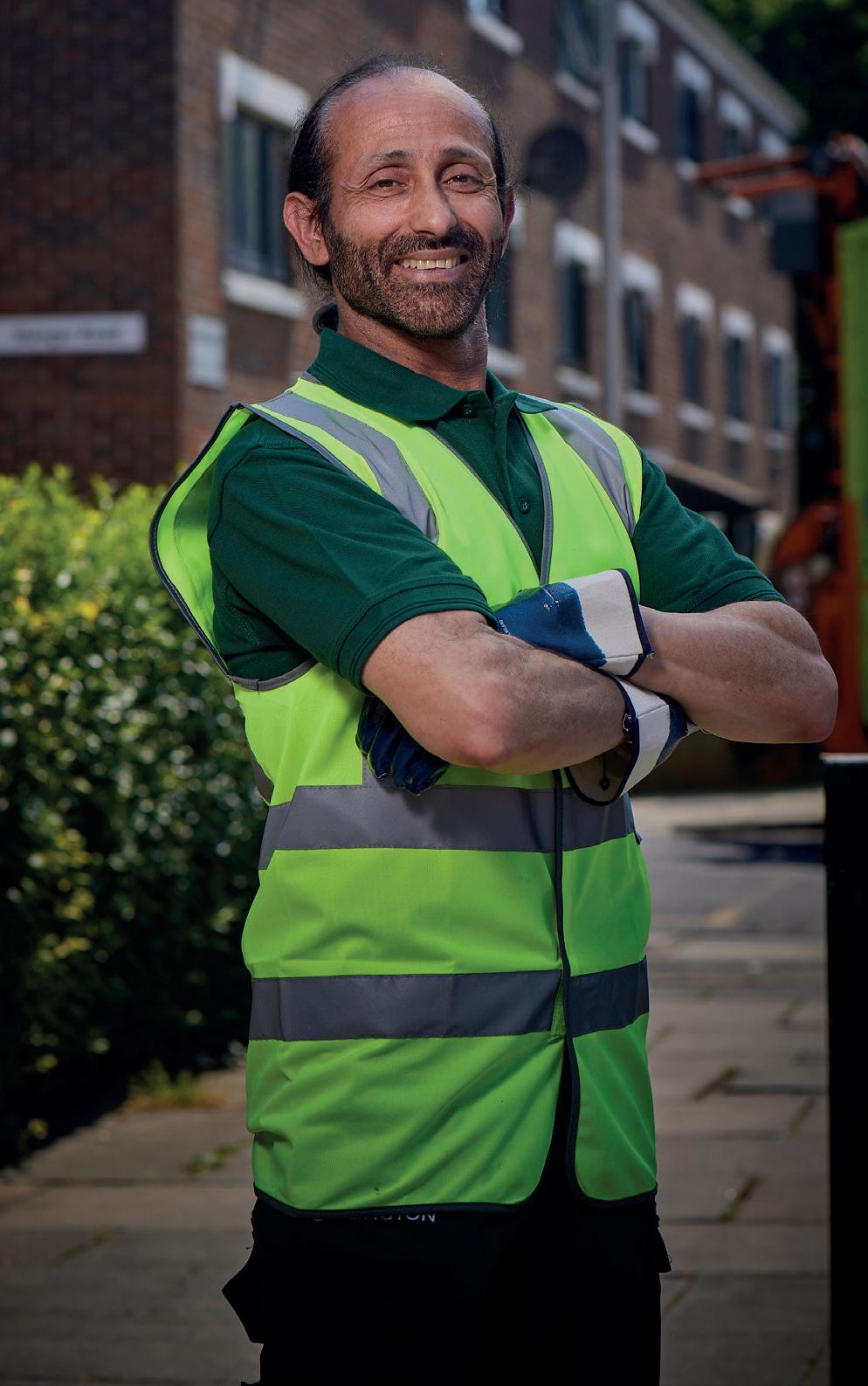
“Recycling is free and it’s easy. You can get the free bags from the local library or leisure centres. It helps the environment. It saves money. There are so many reasons to recycle as much as we can.”
Chaya, recycling engagement door-knocker
“I love working on the front line, seeing how far Islington residents have come when it comes to recycling. The more we can raise awareness, the more people will recycle and the better the future will be for our kids.”
Vince, recycling crew operative

“The council has made it so much easier and more convenient for people to recycle – and it’s free! I know there are a lot of pressures on people these days, but recycling is such a simple way to do your bit.”
Cindy, Islington resident
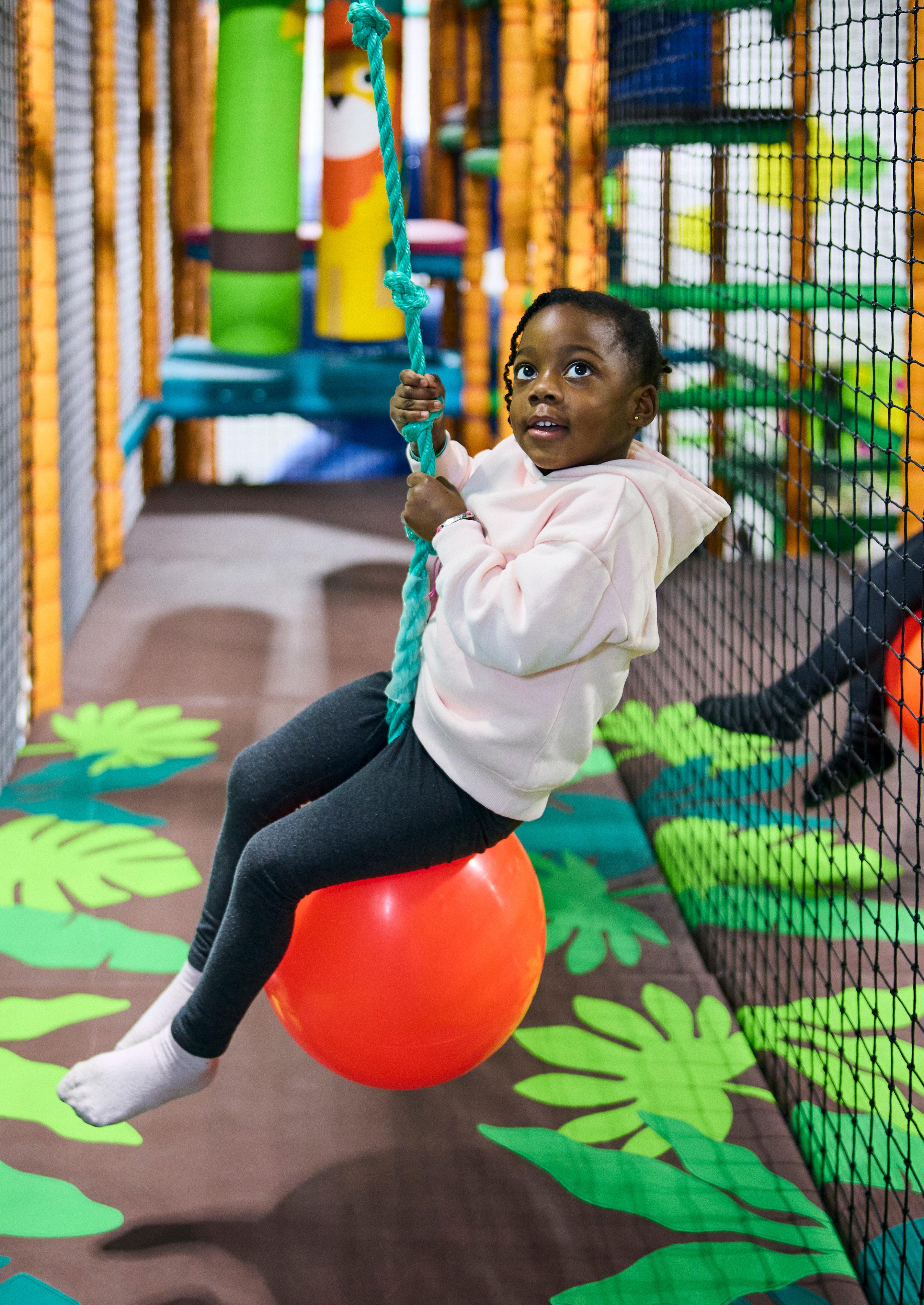



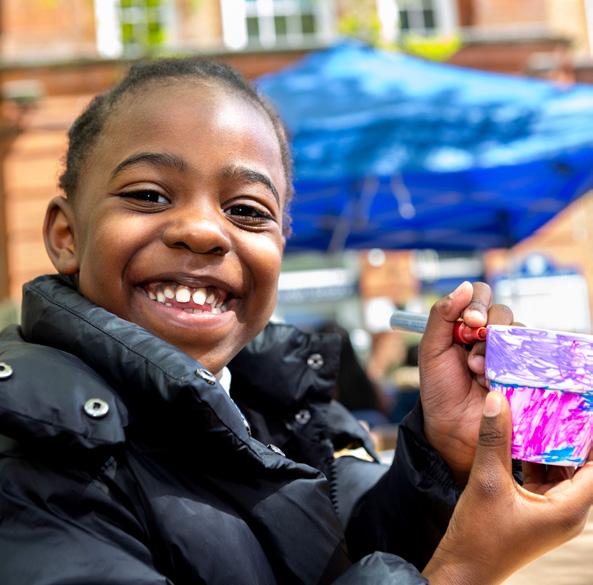
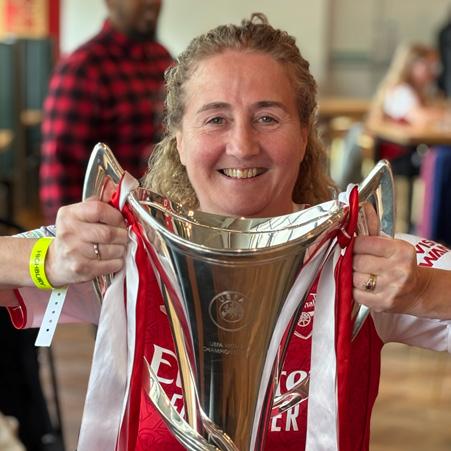
Cllr Una O’Halloran Leader of Islington Council
View this and previous issues online at issuu.com/ IslingtonLifeMag
Be the first to hear about the latest news. Visit islingtonlife. london
Follow us on X @IslingtonBC
You can also find us on Facebook and Instagram. Search for Islington Council
Get in touch! Email us at IslingtonLife@islington.gov.uk
If you would like IslingtonLife in large print, audiotape or another format, please call 020 7527 7301
Recycle me!
Please recycle this magazine once you’ve finished with it.
There’s something special about summer in Islington. The parks are full of life, the streets are buzzing with festivals and community events, and there’s a real sense of togetherness.
In this edition of IslingtonLife, we’ve packed in stories that celebrate the joy, creativity, and resilience of our borough – including our bumper eightpage summer guide for children and families. There’s something for all families in Islington, including at the refurbished Sobell Leisure Centre. I loved hearing from young people who shared their excitement about the new facilities – it’s now one of the best centres of its kind in the country, and offers so many opportunities (p2 of the guide).
We’re also shining a spotlight on the White Lion Music Studio at Lift Youth Hub (p4 of the guide), which has just celebrated its first birthday. It’s a fantastic space where young people can write songs, produce music, and even create their own podcasts – all for free. It’s just one of the many ways we’re helping young people in Islington unlock their potential.
Keeping our communities safe is always a top priority. On p15, you’ll meet Sarah Armstrong, one of our brilliant community safety officers, who helps run Islington’s Safe Havens. These are places where anyone feeling unsafe can find a friendly face, a seat, and a moment of calm. It’s a simple idea that’s making a big difference.
Speaking of community spirit, I was so inspired by the pupils at
Ambler Primary School, who’ve become mini eco-warriors thanks to a brilliant project with the North London Waste Authority (p18). From championing composting to making pledges around food waste, these young changemakers are showing how small actions add up – and are having great fun while they’re at it!
We’re also proud to announce more than £500,000 in grant funding for incredible local organisations supporting refugees, migrants, and people seeking asylum (p22). What makes this even more special is that the funding decisions were made by a panel of residents with lived experience of being refugees, migrants, and people seeking asylum – highlighting again that Islington is truly a Borough of Sanctuary.
Finally, one of my personal highlights of the summer so far has been the success of the Arsenal Women’s team in the UEFA Women’s Champions League. I had the pleasure of joining a special celebration event, and we’ve invited the team to the Town Hall later this year. Their achievements are a huge inspiration – and a reminder of how sport can unite and empower.
So, whether you’re planning summer adventures with the kids, looking to get active, or simply want to connect with your community, I hope this edition gives you plenty of ideas and inspiration. Here’s to a joyful, safe, and sunny summer in Islington!

To receive news and updates directly to your inbox visit islington.gov.uk/StayUpdated
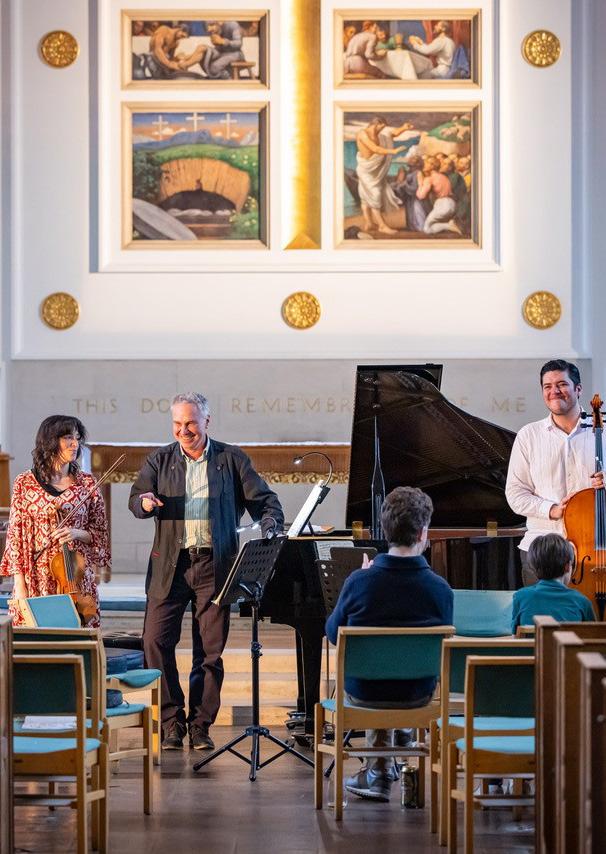
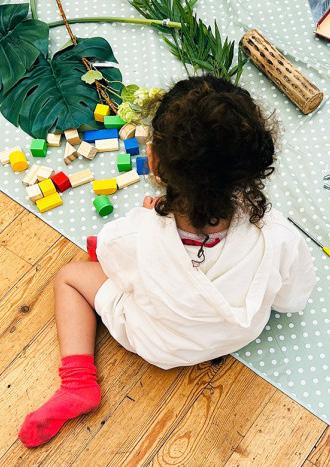
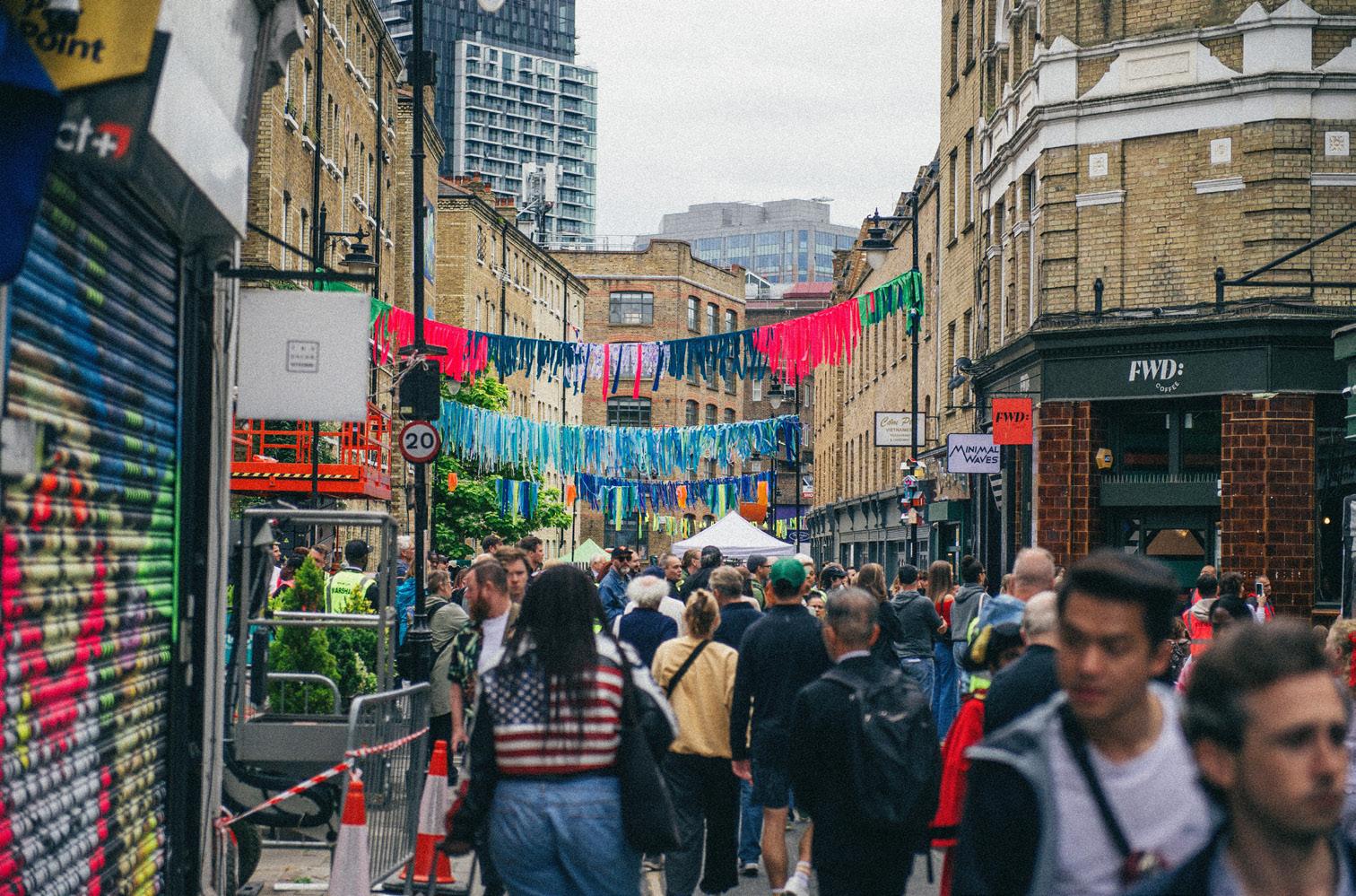
Who needs to leave the country – heck, who needs to leave the borough?! – when there’s this much going on over summer here in Islington. Islington Festival of Music and Art, Whitecross Street Party, performances from the National Youth Theatre, exhibitions at Japanese Gallery Angel and the Institute of Physics, family fun at Estorick Collecton… we could go on. Check out what’s happening and get booking.
islingtonlife.london/summer-cultural-events
The council is looking for young people to lead a digital campaign about all the amazing things to discover this summer – capturing the real Islington through creative videos that celebrate its hidden gems, local hangouts, sports, music, fashion, tech, food, and more. There are only a few spots as Chief Discovery Officer to be won, with the reward of a summer of creative challenges working alongside a professional communications team, plus shopping vouchers up to £250 and exclusive Arsenal merchandise.
Entrants must be aged 11–18 and live, work or study in Islington. Submit a 30-second video of yourself showing what makes Islington special for you by 25 July to enter.
islington.gov.uk/ DiscoverIslington
Islington’s Children’s Services has been rated ‘Outstanding’ for the second time running, with inspectors finding its work is “transforming children’s lives”. Islington is one of only four boroughs in London to hold the top rating under the current inspection framework for both their Children’s Services and Youth Justice Service.
Ofsted’s inspectors also assessed Islington’s Adult Community Learning service, rating it ‘Good’ and finding “calm and purposeful” learning
environments that improve learners’ job prospects.
Know a great carer? Nominate them for an award! Islington’s best social care workers, volunteers and community members will be recognised for their enormous contribution at Islington Council’s 2025 Dignity in Care Awards. Submit your nomination online by Sunday 20 July.
islington.gov.uk/DignityInCare
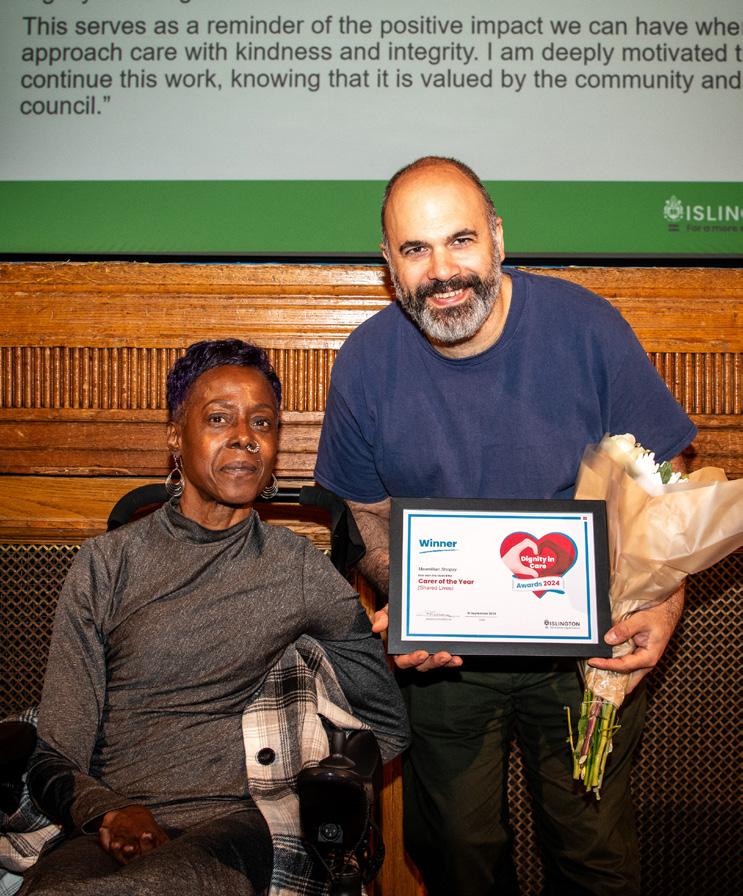
Islington Museum is calling on local ravers and junglists to contribute to a new exhibition celebrating the borough’s clubscene. Got memorabilia or memories you can contribute? Be it an old club flyer or ticket, clubwear, photographs or recordings, the museum would love to hear from you. Email islington.museum@islington.gov. uk or call on 020 7527 2000.
islington.gov.uk/ IslingtonMuseum
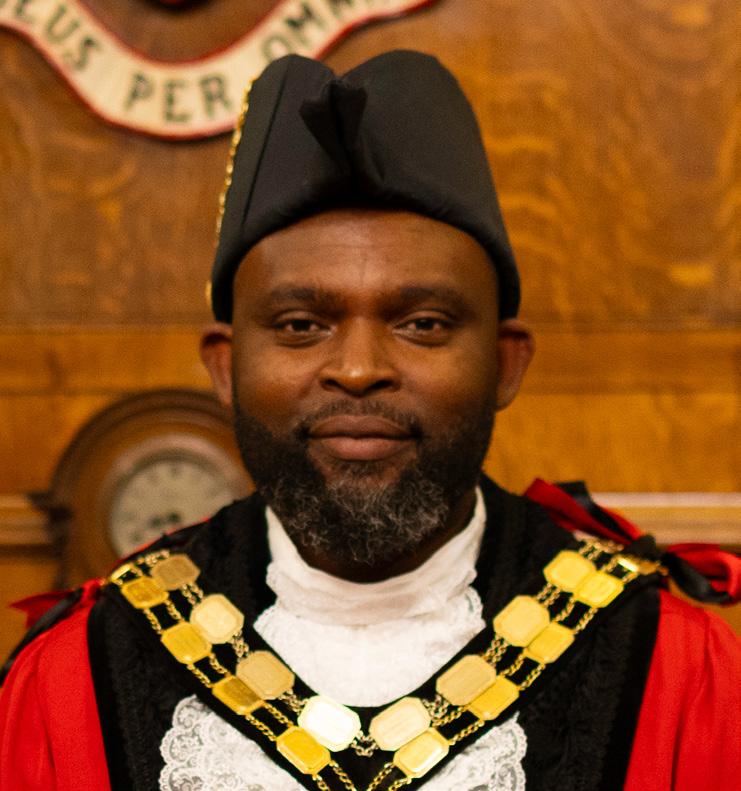
Cllr Jason Jackson is the new Mayor of Islington. A committed community activist, he’s known for leading the Young Black Men and Mental Health initiative and supporting youth employment and innovation. His chosen charity is Islington Giving, who work in mental health and opportunities for young people.
Since December 2024, Islington Council has clamped 115 nuisance vehicles, helping to tackle unpaid fines and reduce repeat offences. Thanks to
community support and joint efforts with contractors, 40 percent of those drivers haven’t re-offended. Find out more and report parking fraud online.
islington.gov.uk/ParkingFraud
Need support to get on a bike for the first time, or want to improve your cycling skills? Womenonly sessions, groups for older people and those with dementia, classes for young people with special educational needs and disabilities – there are sessions for everyone. Many groups can provide bikes for those who don’t have their own, too.
islington.coordinate.cloud/ community-connections
A highlight of summer in the Angel: the canal festival is back on Sunday 7 September, 11am–4pm. Expect free boat trips, live music, craft stalls and street food across City Road Basin and Graham Street. Keep an eye on their website for more details.
angelcanalfestival.co.uk

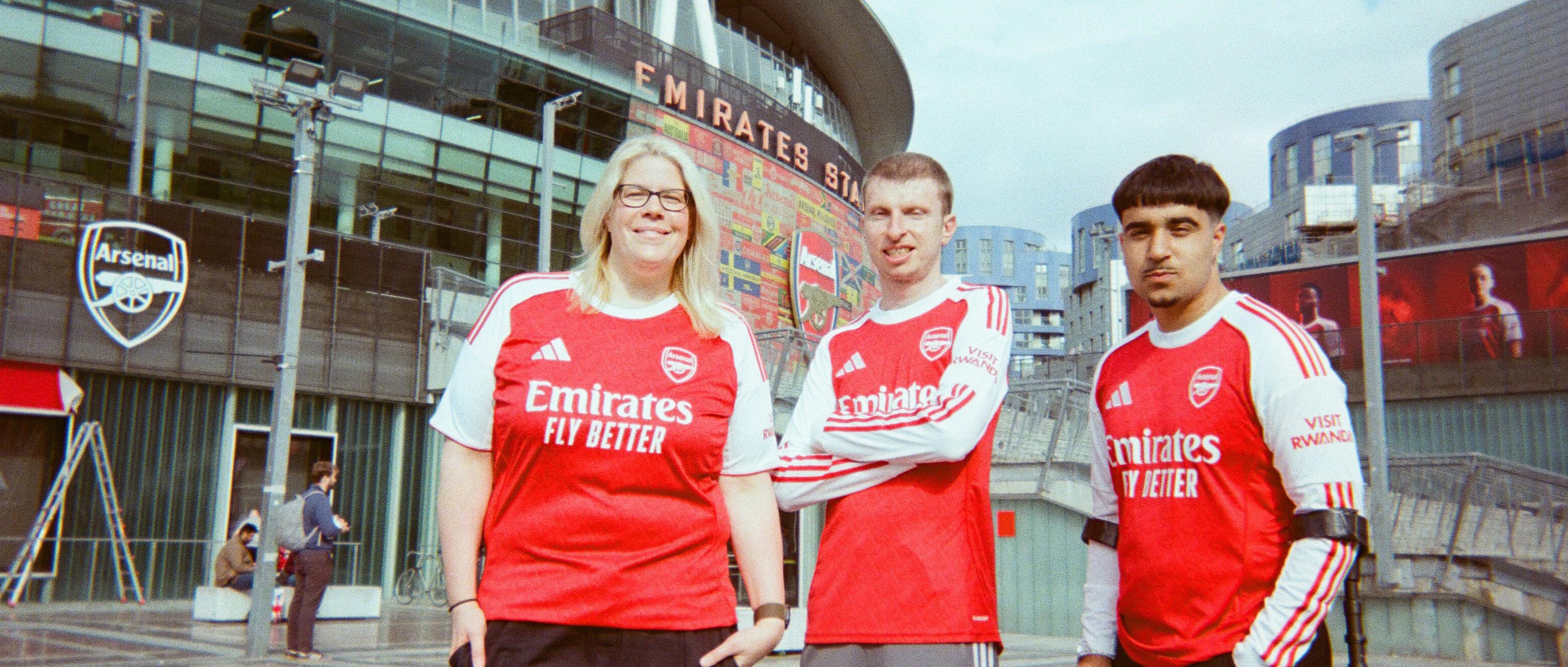
This year sees Arsenal in the Community turn 40 years old. Set up in 1985 as a response to social unrest in London, Arsenal opened its doors to offer a safe space to play football and developed programmes responding to the needs of its community. Now, Arsenal in the Community connects people with the club beyond matchday, delivering sport, health, social, educational and employment initiatives to more than 5,000 people each week.
Just a stone’s throw from Emirates Stadium in the heart of Islington sits Arsenal’s Community Hub, the beating heart of Arsenal in the Community. We sat down with Cat, Sofyan and Luke to hear how they found belonging through Arsenal
Creating safe spaces
As a young girl, Cat longed for the same opportunities boys had. Now she describes something different: “Arsenal has created so many opportunities
for girls to play football.” Cat attends Shape up Sisters women’s and non-binary football at the Arsenal Hub, supported by the Premier League Fans Fund.
Arsenal in the Community has spent four decades creating safe spaces and notably, Head of Arsenal in the Community for 37 years, Freddie Hudson, has just been recognised to receive an MBE. A shining example of this Arsenal Women, born in 1987 when the club offered girls-only football sessions at their indoor pitch behind the Clock End at Highbury Stadium. Arsenal Women is now the UK’s most successful team, having just won the UEFA Women’s Champions League for the second time.
“We feel like we belong here. We’ve built a really tight community,” Cat adds. Recently, a group went to Madrid to watch Arsenal Women. “We’re not just going to play football – we’re seeing our friends.”
Sofyan shares similar experiences. “I used
to be quiet and let the ball do the talking,” he says. “After joining the amputee football group at the Arsenal Hub, everything changed. It gave me the confidence to speak up.” When Sofyan lost his leg, he thought he’d lost his connection to football. However, his bond with Arsenal in the Community’s coaches helped him grow. “Arsenal brought back my football obsession.”
Despite only being 17, Sofyan now captains his amputee team and hopes to represent England at the 2026 Amputee World Cup.
We all fuel each other
“The community is part of the club. We all fuel each other,” Sofyan explains. “I feel pride when I say I’m going to play football next to the stadium. As a community, we have a voice in Arsenal.”
Luke, born and bred in Islington, has been involved with Arsenal in the Community for 15 years. For the past five, he’s been a committed member of the club’s
learning disability football sessions, in partnership with Mencap.
For Luke, Arsenal is all about the emotion and the atmosphere that makes you feel part of something bigger. “On match days, I love seeing people wearing Arsenal tops. It makes me feel proud wearing mine.”
N5 as the epicentre
Arsenal in the Community’s work is rooted in providing safe spaces, championing positive role models and building a culture of togetherness. Judging by the energy at the Arsenal Hub, they’re set up to keep moving forward. After 40 years of bringing pride, inspiration and belonging to their local community, Arsenal has become the beating heart of Islington. There are millions of Arsenal supporters around the world – and N5 remains the epicentre of it all.
Learn more about Arsenal in the Community and get involved: arsenal.com/ community
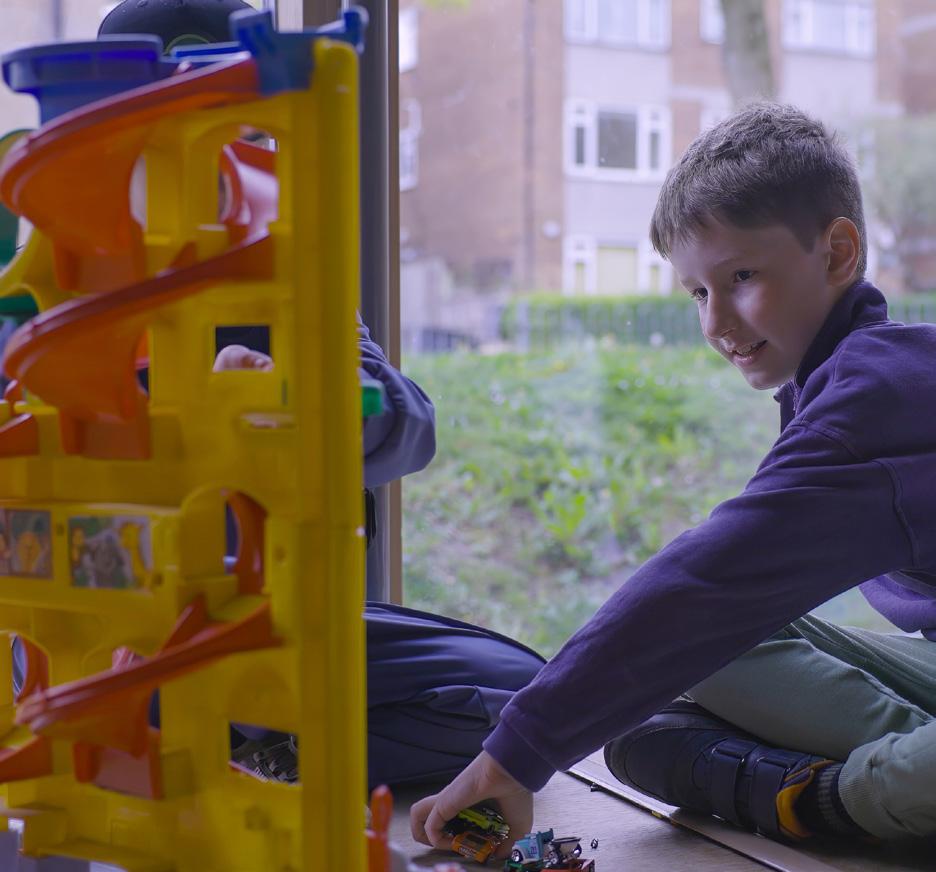
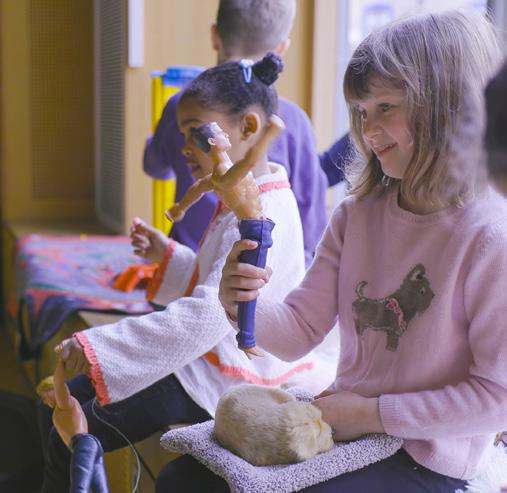
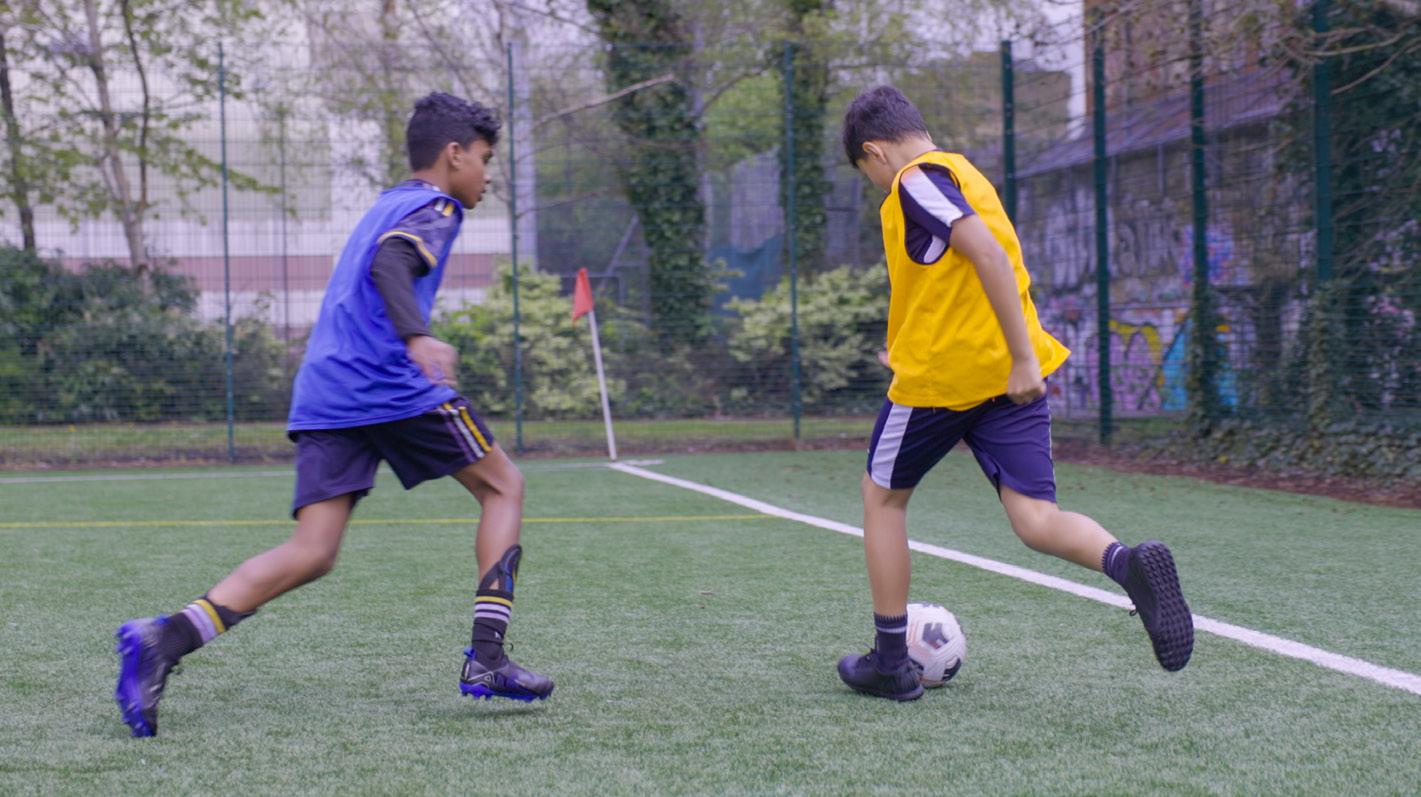

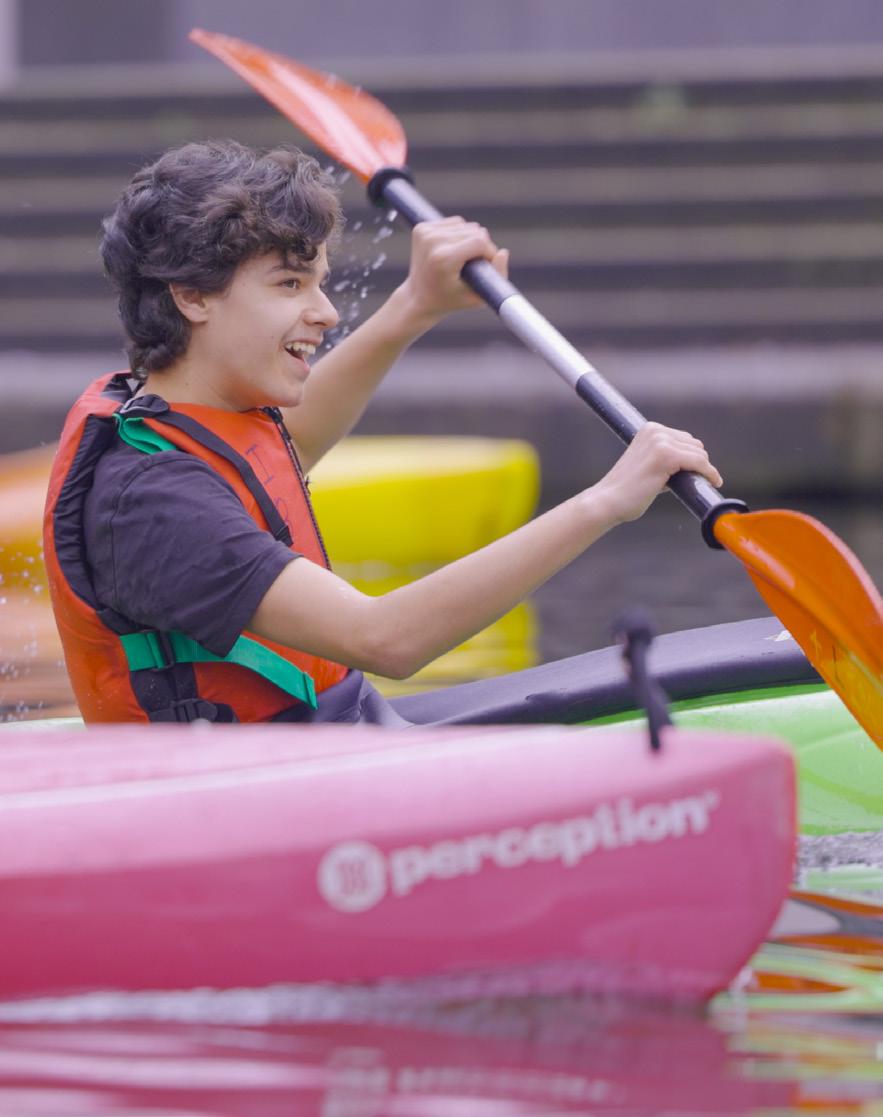
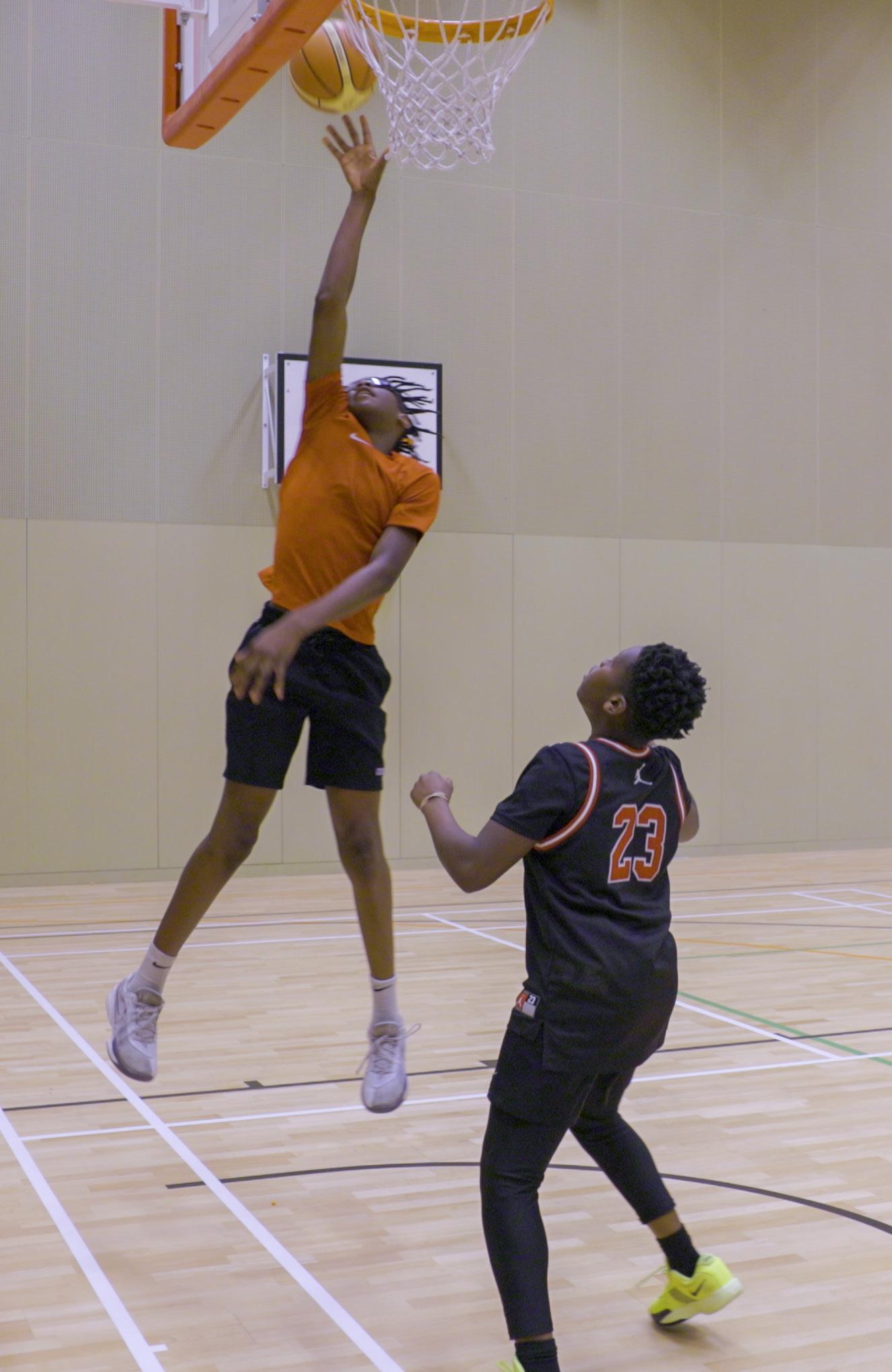

Sobell Leisure Centre has been an Islington institution since it first opened in 1973, when philanthropist Sir Michael Sobell gifted the land and contributed to the building of the centre. Following a devastating flood in 2022, which led to the whole of the ground floor being written off, the council and partner Better took a fresh look at the space.
The newly refurbished centre is now fully up and running, with improved facilities including basketball and squash courts, a gymnastics zone and new changing rooms. The kids’ active zone, which offers interactive fun for children under ten, has seen a record number of people visiting the centre –and now that the new multi-active zone is open, it’s only set to become more popular. We spoke to four young people to find out what they think of the new and improved centre
Mark, 13
I come here for trampolining and gym sessions. The new trampolining zone is an area for people to have fun and if they enjoy it, they might like to try the bigger trampolines in the sports hall. The multi-active area is so much better than before. It’s got loads of
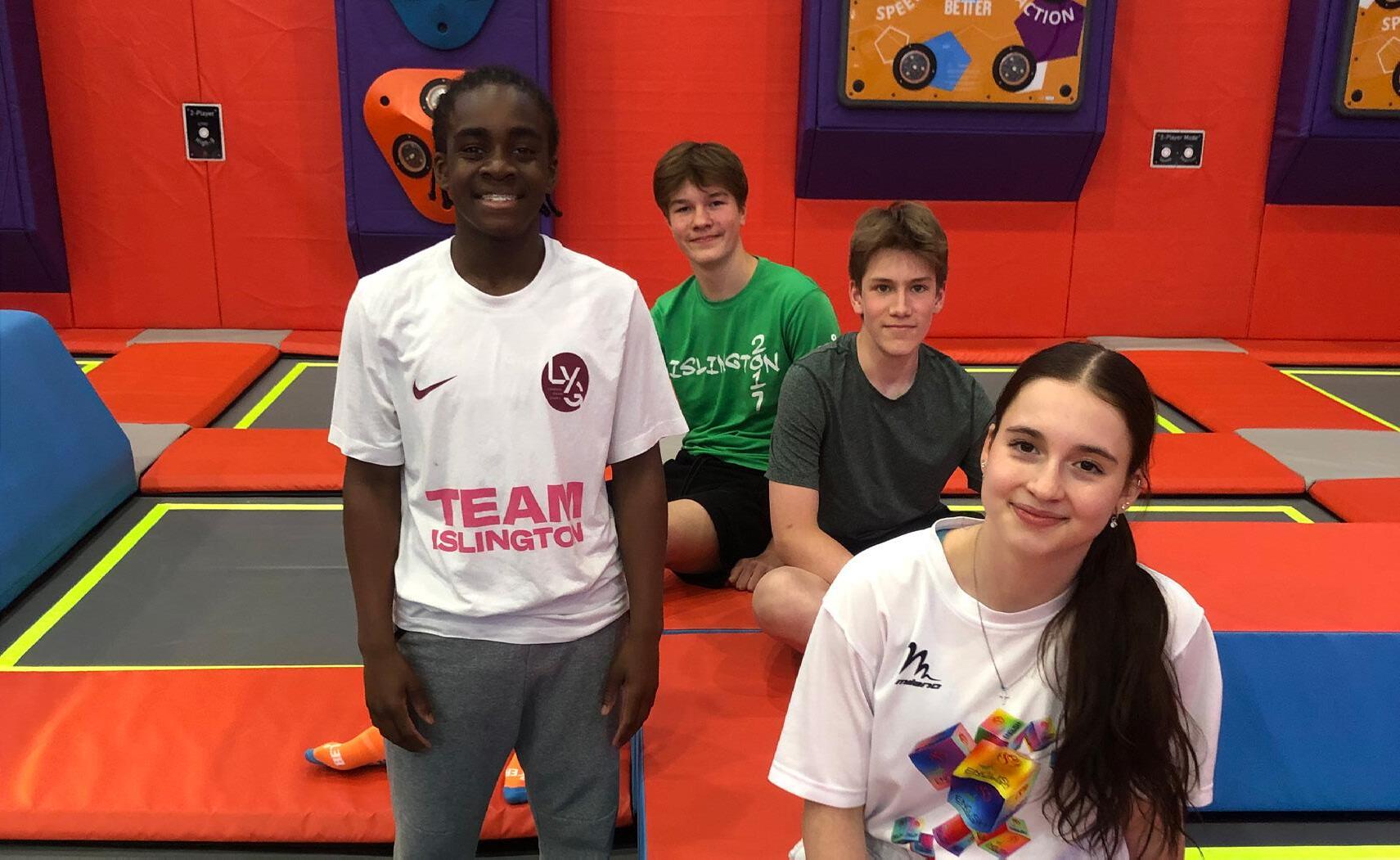
games you can play, including a zip line which is pretty scary! It’s quite unique too, I haven’t been on one like that before. The whole centre is very nice now, so clean and modern. The staff are incredibly nice as well, very friendly. It’s like a community here, we all know each other.
Bianca, 17
I’ve only been coming to Sobell for two years. I started coming to gymnastics sessions, now I am employed by Sobell as a gymnastics coach and come after school and Saturday afternoons to teach. Better also paid for me to get my Level 1 coaching qualification.
I think they’ve used the space really wisely. The new gymnastics area is great – the sprung floor is soft and carpeted,
so the kids can do a lot more than before. The kids’ active zone is great too, for little kids, away from the bigger kids and adults – and the teenagers can enjoy the multi-active zone away from the little kids! With all the activities and games in there, it’s a good way to stay fit and have fun at the same time. Sobell is a great place to be, everyone is really comfortable here.
I first came to Sobell when I was four. I was always jumping on my mum’s bed, so she brought me to Sobell and got me jumping on the trampolines instead! Since the flood we’ve been training at a different centre, but it’s so great to be back at Sobell. I feel like I grew up here – it’s home! I train three times a week, two trampolining
sessions and one gym session. I am hoping to go to the Olympics in LA, that’s my main goal.
I live ten minutes away from Sobell. I joined at the same session as Kye, so we’ve known each other a long time. I’m excited about coming back to Sobell: what they’ve done with it looks really good. They’ve managed to fit a lot more in than there used to be here, with two sports halls, active zone, kids play zone, gymnasium and a gym. I think people will come in to do one thing but when they see all the other activities that are on offer, they’re bound to want to give them a try.
Find out more about what’s on at Sobell: better.org.uk/sobell
Mum-of-two Fathima Nazeem on the progress she’s seen in her two-year-old son Zain after he joined the nursery at New River Green Children’s Centre
Why did you decide to send your child to nursery?
I was reluctant to send my first child to nursery, as I thought it was best to have him stay with us at home before starting school. But with Zain, I’d heard from other parents and Bright Start staff about the benefits. So, I got him a place at New River Green Children’s Centre for the free 15 hours during term-time.
Have you noticed any changes in Zain since he started?
He loves it and is doing so well! He’s more independent and his language has improved massively. I had noticed his language wasn’t as advanced as my older son at the same age, but now Zain is communicating so much better and is more confident to try new things. The nursery has a beautiful garden, too, and he loves being outside.
How have the free hours helped?
I’ve been going to Bright Start
stay and play sessions with Zain from an early age and have gained so much from speaking to other parents and staff. You can chat about your child and any concerns you might have. They told me about free early learning at nursery or with a childminder and helped me understand that Zain would be safe and well cared for.
With Zain in nursery, and through my opportunities as a Bright Start parent champion volunteer, I’ve got some qualifications and built up my CV. Zain enjoys nursery but loves the balance of being at home with us the rest of the time.
From September, eligible working families can get 30 hours a week of free childcare –up to 1,140 hours a year – from the term after their child turns nine months. You must get your code by 31 August for a September start. Find out more about free early education and childcare: childcarechoices.gov.uk
Contact the Family Information Service for advice on 020 7527 5959 or email fis@islington. gov.uk. For more info, visit the website: islington.gov.uk/fis

White Lion Studio was opened in a blaze of publicity by awardwinning rapper, singer and actress Little Simz just over a year ago. The state-of-the-art professional recording studio, inside Lift youth hub, has since welcomed almost 200 young people through its doors to explore their creativity, develop new skills and passions and kick-off careers. Lead youth worker Nathan Samuel, studio technician Tyrese Julian and studio user Avonni Joseph reflect on its success
What does the studio mean to you?
Tyrese: I’d always wanted to have some sort of studio space to work in and this kind of feels like that dream. I now have a place to do music professionally. I drew inspiration from other studios such as Metropolis to help make this place what it is today. Now the young people coming in get the best of the best and don’t have to spend doing it.
Nathan: I have been coming to Lift since the early 2000s and there had never been a music studio in the local area in all these years. For a lot of young people, to have a studio of our own is really a big luxury –especially one that looks like this. You just see their faces and their eyes light up. And I’m always impressed and amazed with what they do here.
What kind of success have you seen coming out of the studio?
Avonni: It’s been mixed, but people who’ve been here from the start, who have got a taste for it and seen it through, are
Check out what’s on at the dozens of youth clubs across Islington: islington.gov.uk/ YouthClubs

managing to get booked to perform. For example, as a result of my work in the studio, I had a performance last Saturday, I have another performance coming up on Sunday and a music video coming out that same day. Some people here are even performing at their upcoming prom.
How do young people find juggling this with their studies?
N: It definitely gets quieter when the GCSE or A-Levels season starts, then sort of bounces back a bit afterwards. I think a lot of people find that it helps take their mind off the stress of exams. We also offer support with Study Space, where they can use a free laptop and print off stuff like test papers, to help them work through it.
A: When I was doing my GCSEs, I would just come here and do
music as a way to take a break from doing continuous hours of studying. I definitely think it’s beneficial for young people, because there can be so much pressure around finals and exams.
What does the future hold for Lift youth hub?
N: The studio is hoping to build on the successes that the first year has brought. We’ve also opened up a second dance studio here at Lift and have begun discussions about a filming room that can facilitate anything from short films to music videos.
Lift youth hub is free and open to everyone aged 11–21 in Islington. Open every day from 3pm, it offers a gym, games room, dance studios, professional teachers and much more. See what’s on: liftislington.org.uk
Summerversity is back! Giving Islington’s young people aged 13-plus the chance to learn new skills, develop interests and talents, make friends and have fun. Many offer accreditations leading to nationally-recognised qualifications – great for CVs. From 21 July–22 Aug there’ll be more than 90 courses in 25 venues. Most are suitable for beginners and a free meal is available with many of the activities. Highlights include sports leadership at Finsbury Park, kayaking at Islington Boat Club, animal care at Freightliners Farm and backstage skills at the National Youth Theatre. Brochures are available in libraries, youth clubs and secondary schools.
summerversity.co.uk
Activities and youth support
This summer, youth workers will be heading out into the community offering fun activities such as football, bowling and go-karting trips. They’ll also be sharing advice and support about opportunities in the borough for young people. The targeted youth support team’s new mobile youth engagement


hub will also be visiting estates – an open, welcome space to make connections with young people, on their doorstep.
Rose Bowl summer celebration
A celebratory event for all ages featuring inflatables and circus acts, sports day fun and a host of surprises. Slip into the summer mood with live music and a barbecue. Head down to St Paul’s Park, N1 2PT, from 12noon–5pm on Saturday 19 July. Free entry!
rosebowlislington.org.uk
Free swimming lessons
Throughout the holidays, the council and Better leisure centres are offering free swimming lessons for four to 16-year-olds, families and those aged under four with an adult. Sessions take
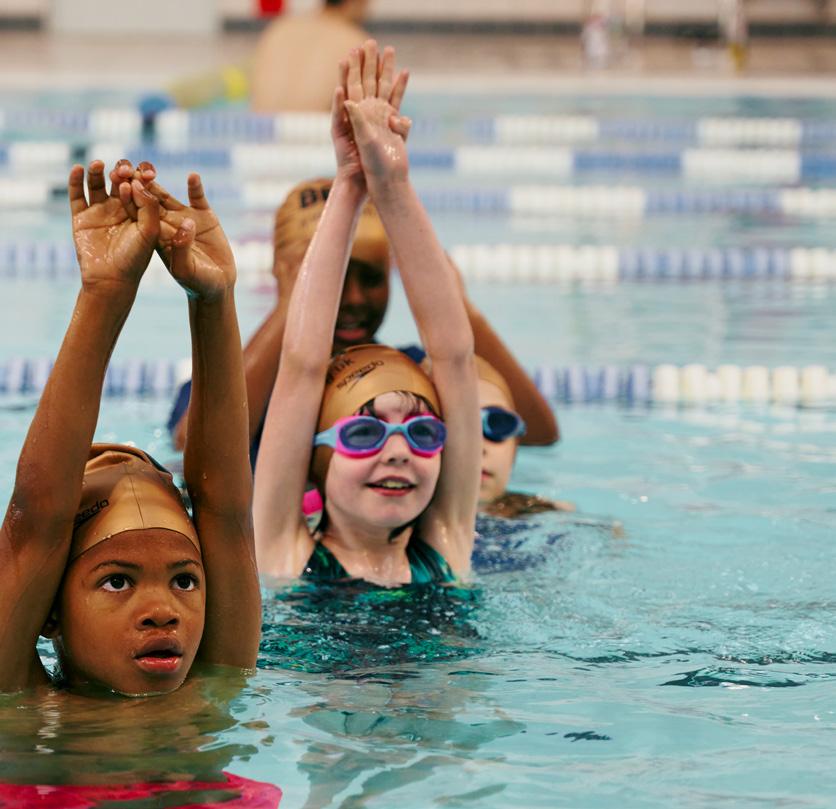
place at Archway Leisure Centre, Cally Pool, Highbury Leisure Centre and Ironmonger Row Baths. Apply online.
better.org.uk/ free-swimming-lessons
There are lots of brilliant free activities this summer for under-fives in Islington’s Bright Start green spaces and children’s centres. The summer programme focuses on connecting children and families to nature and being active through outdoor stay-and-plays, forest school sessions, outdoor story and music time, yoga and more. See full listings online.
islington.gov.uk/BrightStart
If you’re looking for summer childcare, the Family Information Service (FIS) can help find lowcost or free activities during the holiday and after school. Holiday childcare schemes run from some schools and community venues. The FIS can also help you find childminders – a great option for ages six months plus. Call on 020 7527 5959 or email fis@islington.gov.uk
islington.gov.uk/fis
There’s plenty to discover at the Sobell Leisure Centre, including soft play in the four-story children’s Active Play Zone. With climbing frames, ball pits, mazes and an under-twos sensory area, it’s a safe space for babies to eight-year-olds to play, explore and have fun.
better.org.uk/sobell
Cape Adventure Playground has also just opened a new, woodland-themed indoor soft play and family cafe at the Crouch Hill venue (N8 9EG). The low-cost sessions, which must be booked in advance, run every day of the week and are suitable for babies up to age eight.
awesomelittleexplorers.org
Islington’s 11 adventure playgrounds for children aged six to 13 are safe, welcoming, fun and free. Supervised by trained play workers, they offer exciting outdoor structures and play activities that help children develop self-confidence and social skills, and keep active.
islington.gov.uk/ AdventurePlaygrounds
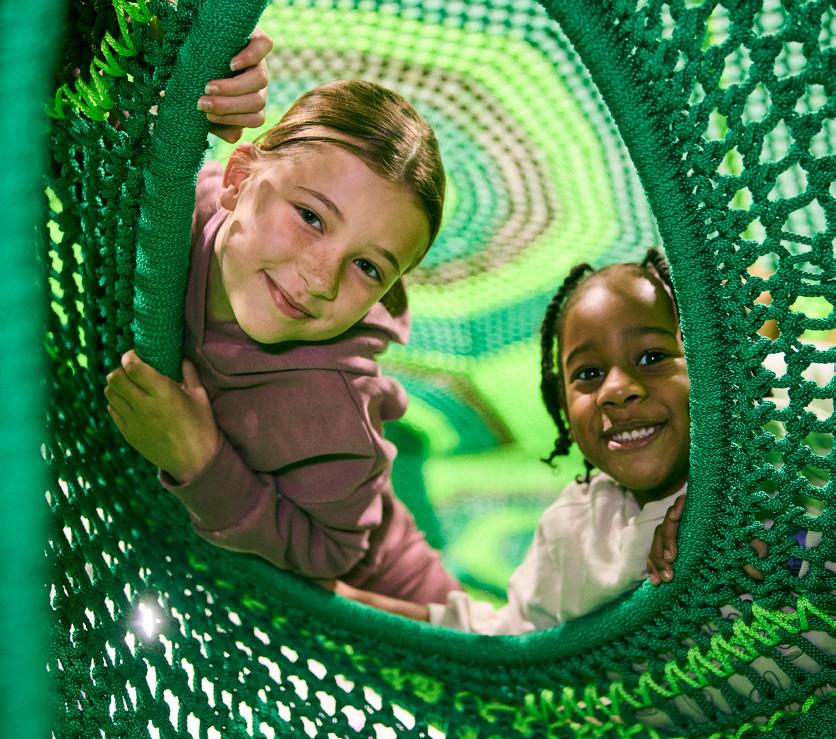
Young people who are feeling stressed, isolated, overwhelmed or low can reach out to social prescribing workers, who aim to provide support through creative, social and sporting activities in the community. The service is open to young people aged 11–25 who live, study, work or have a GP in Islington.
liftislington.org.uk/events/ social-prescribing-team

The Reading Agency and Islington Libraries invites children to step into the magical world of Story Garden, the 2025 Summer Reading Challenge theme, which is all about celebrating the great outdoors and the power of imagination.
All children need to do is read at least six library books over the holidays, collecting stickers and rewards along the way. Children can read any books they like – novels, fact books, comics, poetry or even e-books and e-audiobooks, which can be downloaded for free with an Islington library card. All completers receive a medal and certificate.
Sign up at your local library: islington.gov.uk/libraries



Scan the code to check out what’s on. SummerReadingChallenge.org.uk

Islington Libraries are offering more than 70 free events and activities during the holidays for all the family. Get creative at craft sessions or see how many creepy crawlies you can brave handling with Zoo Lab animal encounters! Plus much more.

Key dates and things to think about ahead of the new term
Apply for a school place
If your child is due to join a school in September 2026, you’ll soon need to apply for a place. If they were born 1 Sep 2021–31 Aug 2022, you need to apply for primary school. If they were born 1 Sep 2014–31 Aug 2015, you need to apply for secondary school. Applications open on 1 Sep 2025 and you’ll need to apply online: islington.gov.uk/admissions
Contact the school admissions team for help on 020 7527 5515 or email admissions@islington. gov.uk. Sign up to receive tips, advice and deadline reminders: islington.gov.uk/StayUpdated
The council provides free school meals for full-time three- and four-year-olds at councilmaintained nurseries and all primary-age pupils. They’re also available to secondary age pupils receiving certain benefits. If your child is eligible, it’s important to register. You’ll also benefit from a range of support including free activities with food during the holidays (turn over for details) and supermarket vouchers worth £15 per week, per child in the holidays.
Apply for a uniform grant
If your child is eligible for free school meals, you’re also entitled to £150 towards the cost of school uniforms when your child transfers to secondary school.
Apply online: islington.gov.uk/ FreeSchoolMeals

“Vaccines aren’t necessary. It’s better to develop immunity by getting exposed naturally” – FALSE
While it is true that natural infections can lead to immunity, they come with risks that vaccines do not. The potential complications of a natural infection – such as severe illness, hospitalisation or death –are far greater than the risk of side effects from a vaccine. Vaccines are a way to build immunity without experiencing the illness itself.
“Side effects of vaccines include a slightly raised temperature, tiredness and redness and pain at injection site” – TRUE
These side effects are common, but short-lived – and a sign the immune system is doing its job! More severe side effects are rare.
“The MMR vaccine causes autism” – FALSE
This is a myth, which originated from a study that has since been discredited and condemned by the medical community, the NHS and WHO. Extensive research conducted by scientists worldwide has shown no connection between vaccines and autism.
“Vaccines contain harmful ingredients” – FALSE
Ingredients are thoroughly tested for safety. Ingredients like aluminium or formaldehyde may sound alarming, but they are present in far lower amounts than we are exposed to daily through food, water, and the environment.
“Vaccines contain animal products” – TRUE
Some vaccinations, including the nasal spray flu vaccine for children and some MMR vaccinations, contain animal products. Ask your healthcare provider when booking if you’d like an alternative vaccine which does not contain animal products.
For more info, visit nhs.uk/vaccinations or speak to your GP or health visitor. Keeping up to date with your child’s vaccinations is one of the most effective ways to keep them healthy and protected.
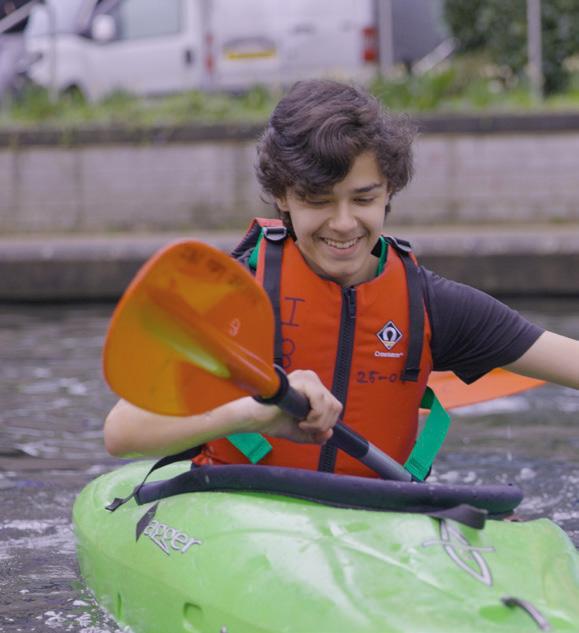




with
21 July-17 August 2025 lunch
Try something new, have a summer of fun and unforgettable moments – lunchtime’s on us!
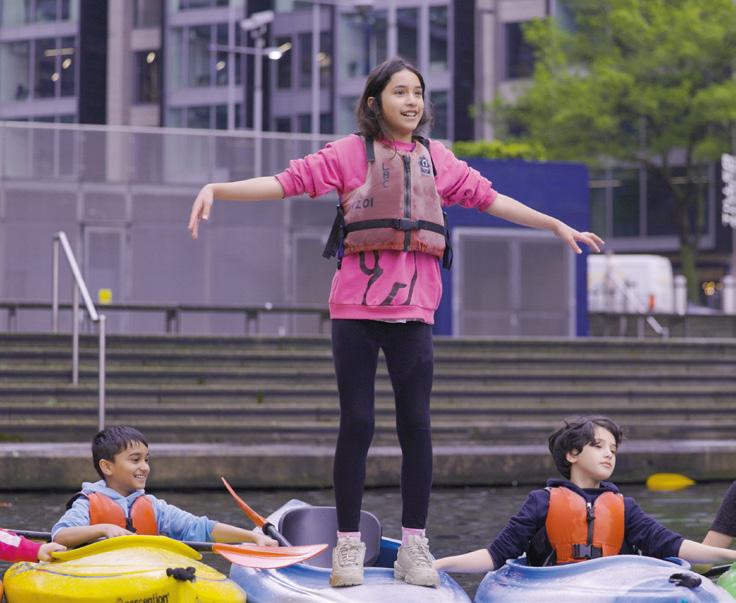
Lots on offer!

Tennis, roller-skating, dance, theatre skills, cooking, basketball, multiplay, football, music-making, crafts, excursions, coding, popstar workshops, boxing, ICT-music management, photography and podcasting, swimming, museum visits... and so much more.
To register and book activities, simply scan the QR code or visit islington.gov.uk/ HolidayActivities
Activities specifically for those with special educational needs and/ or disabilities
Funded activities for those on benefits-related free school meals
Paid-for activities
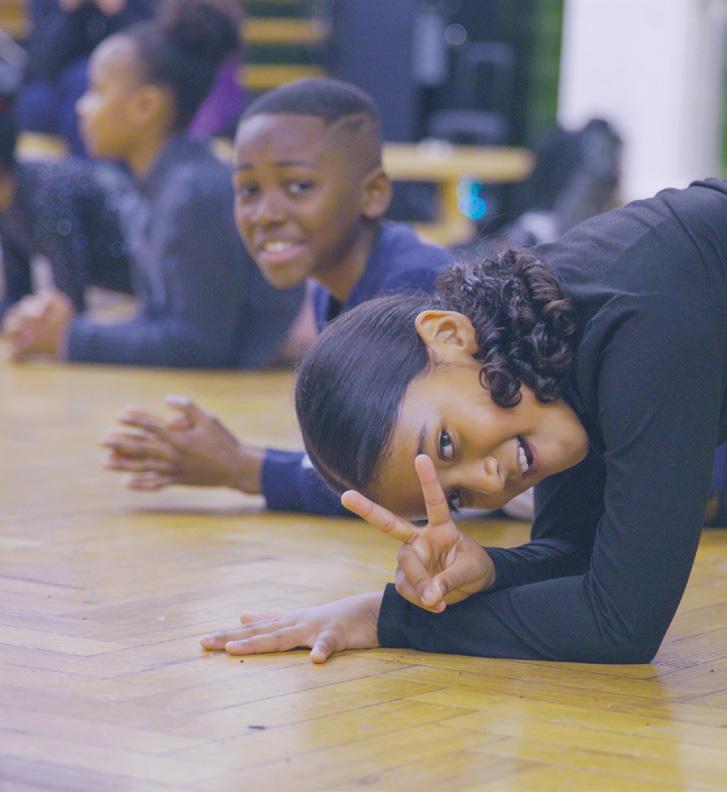


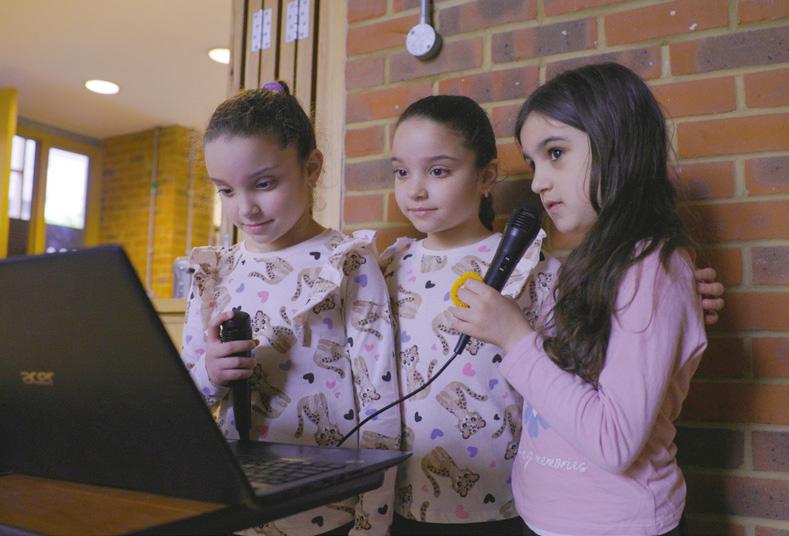
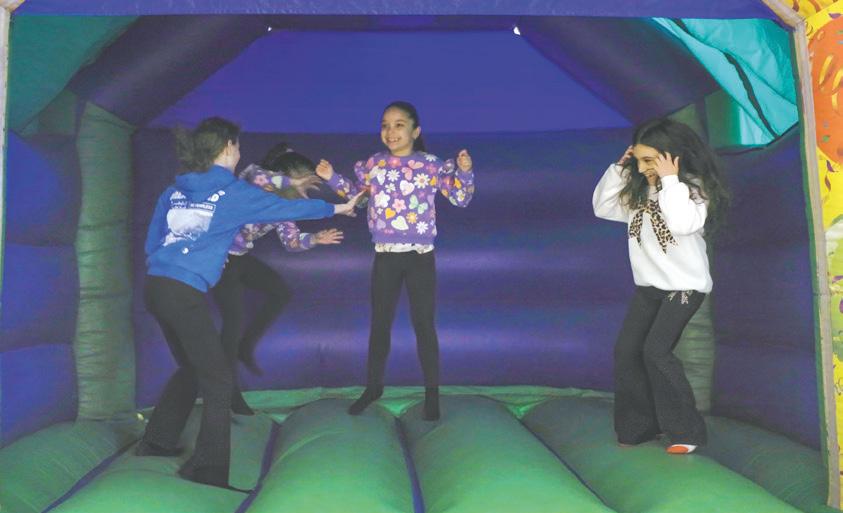
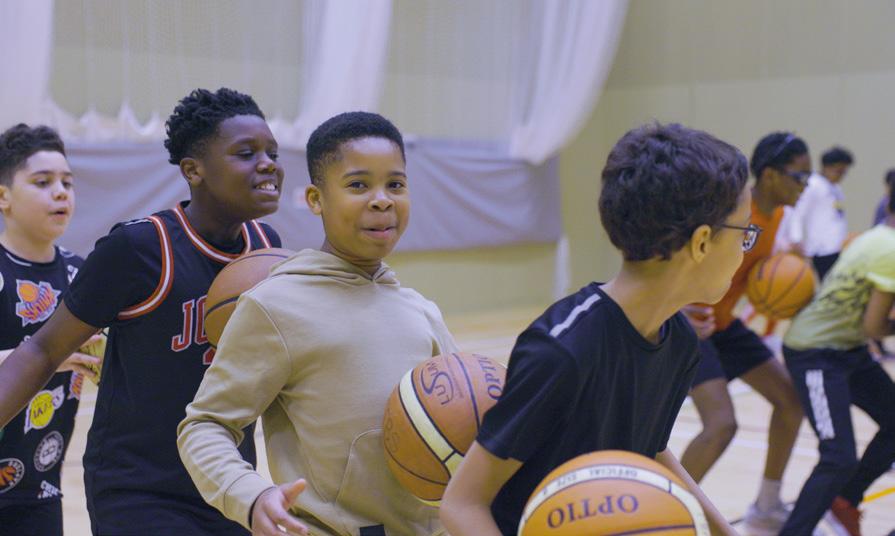

Islington has more than 300 safe havens – spaces where you can go for support if you are in distress or immediate danger. We spoke to council community safety officer Sarah Armstrong to find out how they work and why they’re important
What is a safe haven?
A safe haven is an organisation that pledges to support anyone who is feeling unsafe. This might be offering a smile and a place to sit down, encouraging someone to report a crime, giving directions, or phoning emergency services. They’re often the first port of call when someone needs help.
What are the benefits of being a safe haven?
Safe havens are offered training such as hate crime prevention, dementia awareness and Welfare and Vulnerablity Engagement (WAVE) training. This supports staff to recognise signs of vulnerability and allow them to respond in the most appropriate way. Safe havens receive regular communication from the council and a sticker to
put in their window to show you’re invested in the community.
Do you have an example of a safe haven helping someone?
They support residents in big and small ways every day. The Blackstock Pub helped two women who were being followed. They let them wait inside the pub and called them a taxi. A tourist was feeling unsafe in their hostel and ended up in McDonald’s, visibly upset. Staff were quick to offer comfort and advice on alternative accommodation, making sure they got there safely. The visitor wrote to McDonald’s head office to praise the support they received.
Bisha, an Etriean restaurant on Holloway Road, became a safe haven in 2021. In this time, they’ve intervened in incidents, called emergency services, and supported people with dementia and newcomers to the borough by connecting them with essential services.
What would you say to an organisation thinking about becoming a safe haven?
Many of our most vulnerable residents feel reassured to think there are people looking out for them all around the borough. If this is something you feel like you are doing already, why not sign up and let people know you’re helping make Islington safer?
If you need help, look for the safe haven sign in shop windows. To sign up as a safe haven or to view locations, visit: islington. gov.uk/SafeHavens
Each edition, we look at a different issue raised by local people and explain what the council is doing to fix it
You said...
… the council needs to do more to tackle anti-social behaviour (ASB) that takes place during the daytime
So Islington Council...
… created a new patrol team. The neighbourhood patrol team are out day and night tackling things like rowdy behaviour, fly-tipping and graffiti on streets and estates to make you safer. All patrol officers wear uniforms, have radios for instant communication, and use body-worn cameras for transparency and to gather evidence. This friendly team are working hard to keep you safe. Give them a wave if you see them!
If your estate is owned by a Housing Association or Registered Social Landlord, contact them to report ASB. Otherwise report it using the new online system found at: islington.gov.uk/ReportASB
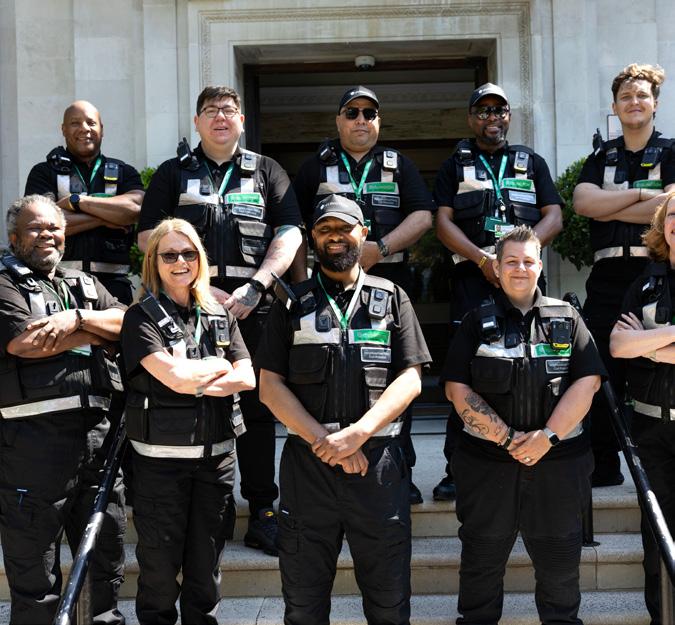
Whether you’re looking to take in some live music, discover a new pop-up supper club, or even play a game of late-night chess, there’s plenty going on in Islington’s unique town centres after dark. We spoke to Ben Stephenson, CEO of the Angel Business Improvement District (BID) and the council’s local town centre leads about their favourite places to go – and the work behind the scenes to make Islington better, and safer
Ben on Angel
Angel is one of the borough’s best-known areas for nighttime activity – and for good reason. From indie cinemas and comedy clubs to 24-hour gyms, karaoke and darts, there really is entertainment for every mood and moment.
The Angel BID is working closely with Islington Council to make Angel feel safe and inclusive, which means attracting a wider range of people – like football fans after Arsenal Women’s games – and offering more alcohol-free activities. The BID’s new Hospitality Network is also giving local bars and restaurants a chance to share ideas, tackle
challenges and celebrate what makes Angel special.
Archway is a brilliant combination of culture and quirkiness. Look out for evening exhibition openings at The Gallery at the Playroom, as well as comedy nights and live music at venues like Nambucca and the Oak and Pastor.
We work with businesses through the Archway Town Centre Group, freelancers via the Archway Creatives network, and evening venues through Archway Pubwatch, to deliver events for locals and tourists alike, that see the high street buzzing with activity. Our recent Rhythm and Ride event brought it all together – a multi-venue music trail showcasing local talent and brilliant places to hang out.
This corner of south Islington is packed with culture, food, and charm. Nearby Barbican and Sadler’s Wells are particular highlights. Whitecross Street is famous locally for its

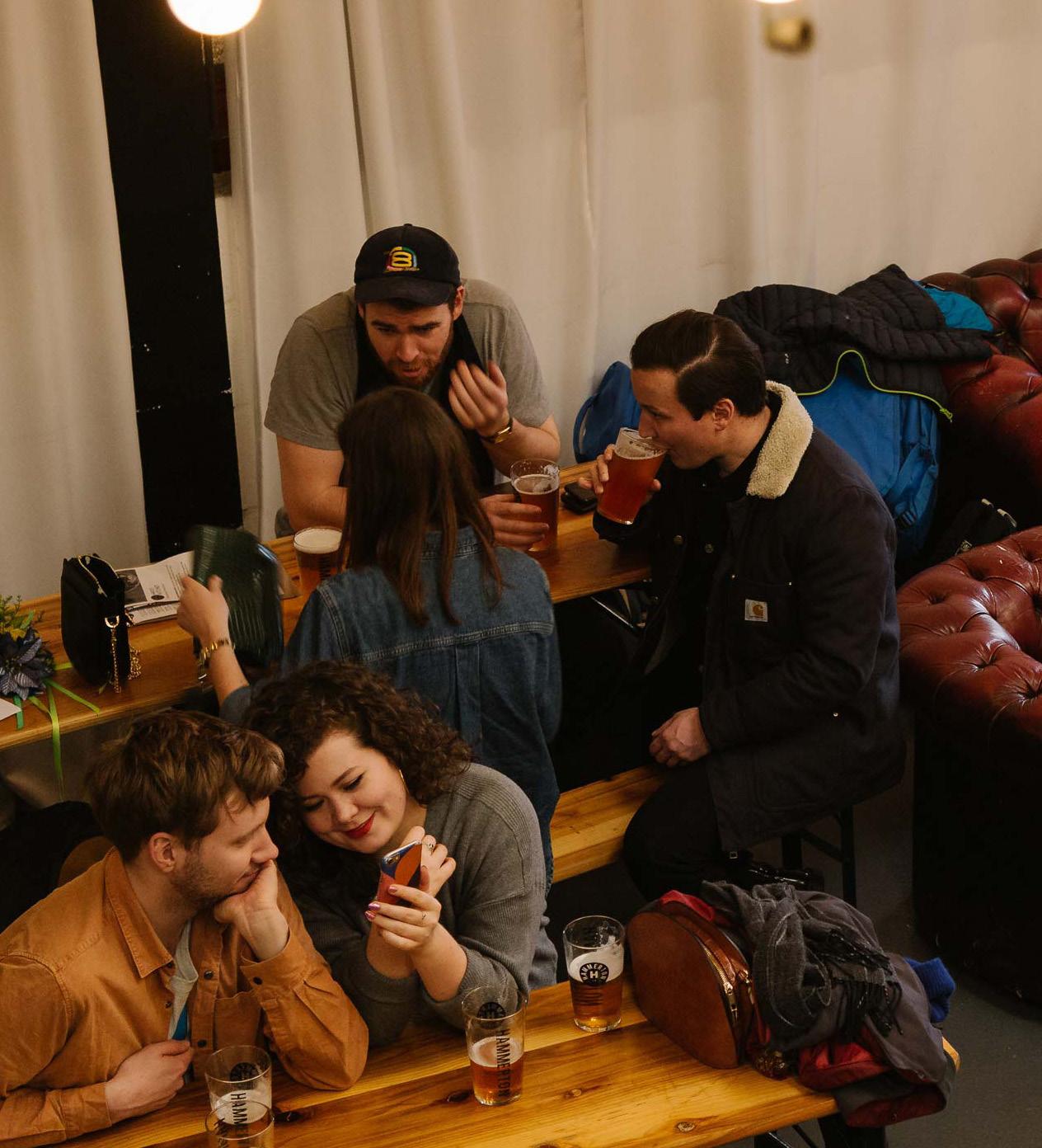
lunchtime market – you can get everything from fish and chips to Korean or Italian food. Pubs like The Two Brewers and Mad Hatter serve great drinks, while Exmouth Market has plenty of independent eateries. Clerkenwell’s historic pubs, like the Hope and The Three Compasses, are full of character. For special occasions, head to Michelin-starred St John’s Food and Wine or Sessions Art Club.
‘The Cally’, as locals know it, has bags of character. The options are so varied: you can solve puzzles at clueQuest escape room, watch Fringe previews at the Pleasance Theatre, or grab a pizza and local craft beer at Hammerton Brewery.
Through partnerships with businesses and the Caledonian Traders’ Association, the area is going from strength to strength. Initiatives like the Love LoCally loyalty card are all about encouraging residents to explore what’s on their doorstep – and get a discount while they do it!
Finsbury Park has a growing reputation as a nighttime
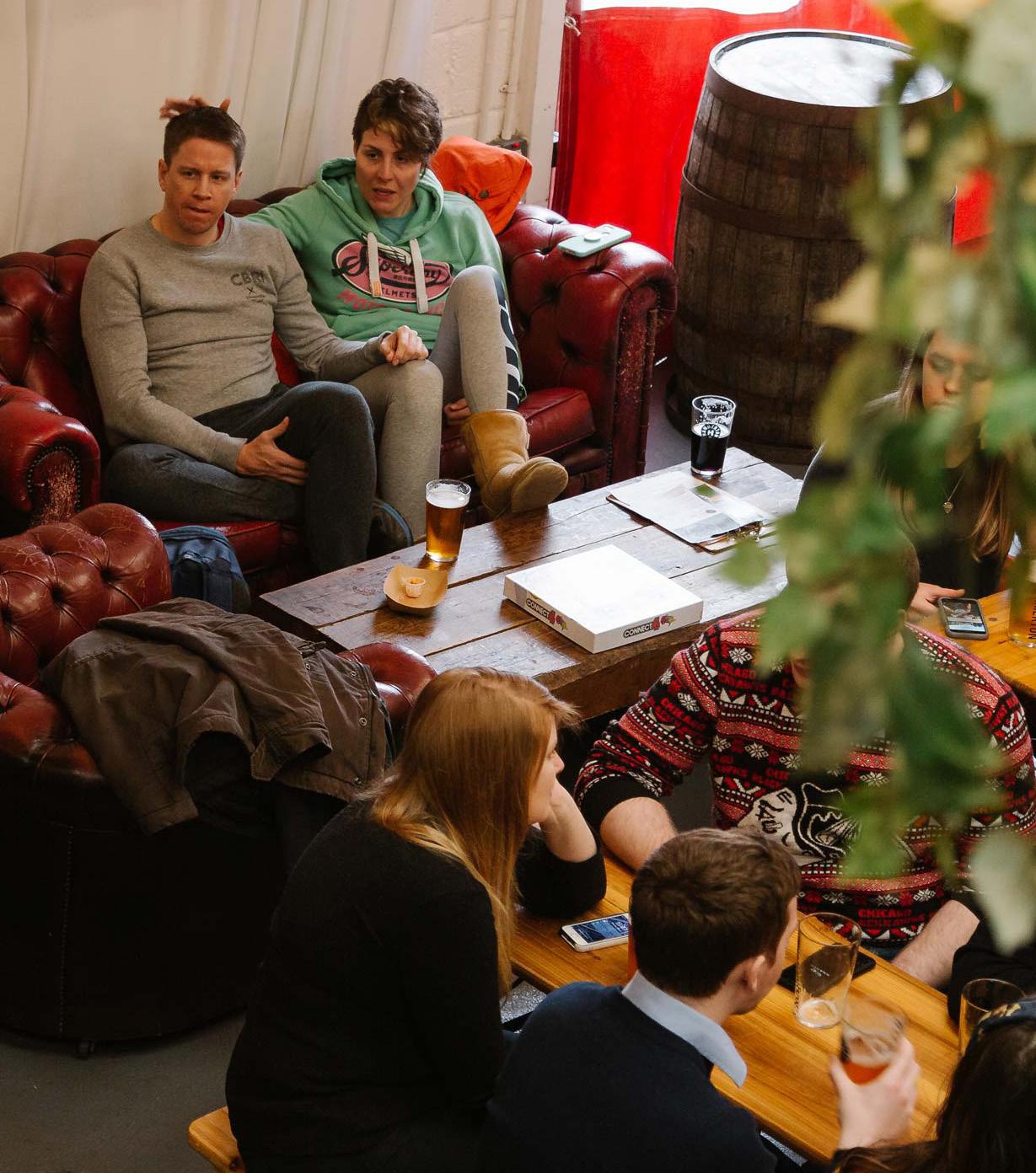
destination. There’s lots on offer: come for a glass of wine at Oak N4 on Wells Terrace, or a night of laughs or drama at Park Theatre. Someday has a unique set up: it’s a workspace in the day and a chilled bar in the evenings.
Finsbury Park is a busy transport hub, so community safety is a priority. We work closely with police, street cleansing and community safety teams to ensure it’ a welcoming and secure space for everyone.
Nag’s Head offers a perfect recipe for a fun night out. Kick off with authentic Malaysian at Sambal Shiok, grab a craft beer at Indiebeer, then head to Big Red for a game of pool and some favourite rock anthems!
We work in partnership with the Nag’s Head Town Centre Group and Holloway Neighbourhood Group. The Nag’s Head Prospectus of Ideas is helping us bring in funding and push forward projects that benefit businesses and the community.
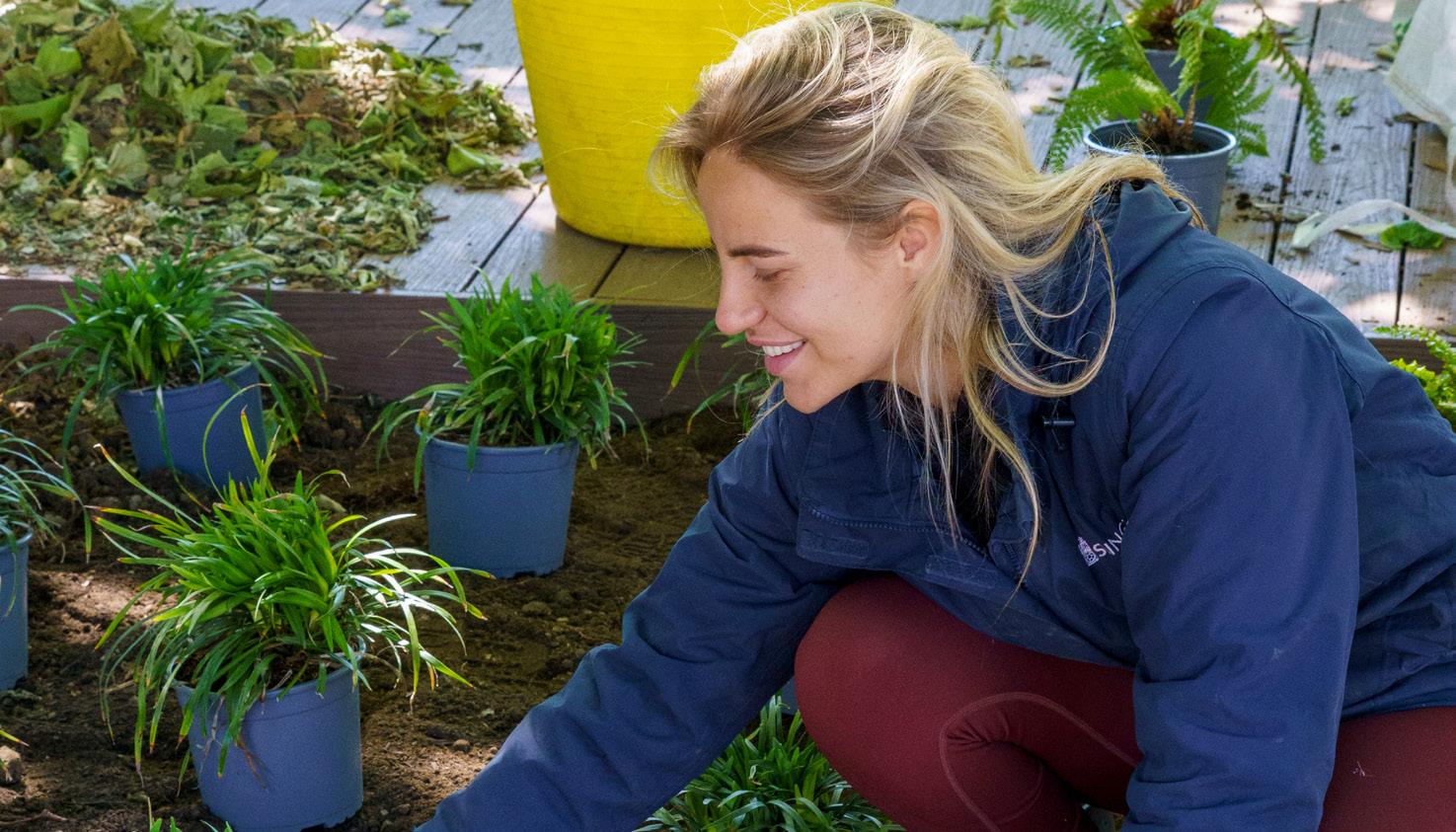
Lilybelle is a community ranger with the south area parks team at Islington Council, working closely with communities to look after Islington’s parks and greenspaces. Lilybelle tells us why she swapped a screen and desk for a trowel and secateurs
My job is all about connecting people with nature and giving them the chance to get involved with their local park or greenspace. I set up community sessions and volunteering events in local parks, which can be anything from gardening and planting to bug hotelbuilding or nature walks. For example, every Friday I lead a group at New River Walk. We get such a great mix of people coming along –older residents, families, school groups – and it’s lovely to see how parks can bring people together.
There’s no such thing as a typical day. One day I might be planning a volunteer session or creating a pollinator trail, the next I’m working with our anti-social behaviour team to keep parks welcoming and safe. I also support local Friends of Parks groups, help organise events and roll up my sleeves for weeding and pruning.
Before this, I worked in recruitment in the City. I wasn’t enjoying the office life, and after dealing with long Covid and some ongoing health issues, I knew I needed a change. A friend told me about the community ranger apprenticeship, so I applied, got it and I haven’t looked back! I’m a really social person, and this role is all about talking to people, getting involved, and making a difference. Parks really can be places where people feel part of something.
Check out our website for upcoming events: islingtonlife. london/things-to-do
Help look after your local park. Visit: islington.gov.uk/parks

How Ambler Primary School, with help from the NLWA, is getting children excited about waste and recycling
When it comes to getting kids to do something, ‘make it fun’ is a pretty failsafe mantra. It’s the first thing the North London Waste Authority (NLWA) will tell you when you ask how they’ve managed to turn pupils at Ambler Primary School into mini eco warriors, on a mission to fight waste and increase recycling.
It’s part of a programme called In the Know, designed by the NLWA and teachers to get north London primary schools tackling waste. Ambler is the first in Islington to take part. “Reducing waste has always been one of our priorities, but this project has really given us new focus,” says Beth, reception teacher at the school (pictured above). “The children –and I – have learned

so much. They’re all really on board: they’re very into making sure things go in the right bin and they’re always so keen to tell me if they’ve eaten everything on their plate.”
The school has introduced food waste caddies in the playground and composters, as well as appointed two composting champions. “We put weeds and fruit in the compost and it makes it into soil that you can reuse again,” says Nyla, age four. “I learnt that we can grow plants from compost made in the compost bin. And, if we buy new things that we already have, it is a waste of money and won’t be good for the planet,” adds Amin, age six.
Pupils have taken ownership of the project in other ways, too, with each class making a pledge, such as “we will only take what we will eat” and to “eat
sensibly so that no food will fall on the floor”. The Year 6 ‘school captains’ delivered their own assembly, too, which “had a big impact,” says Beth. “We had a picture of a bowl of spaghetti and told their peers that that is how much everyone is throwing away each lunch time, then went through three different ways we could reduce it.”
Each term has a different theme, which kicks off with an assembly and is woven into the children’s lessons. “We are all realising that sustainability is a priority,” Beth continues. “Sandy, our head teacher, hopes to build a school community that leads the way in caring for both the local community and wider world.”
Find out more about the In the Know project and how your kids’ school can get involved: nlwa. gov.uk/InTheKnow
In each issue, we delve into the different ways Islington parks and greenspaces are benefitting people’s wellbeing. This time, we spoke to Jane Palmer, criminal justice pathways coordinator with the NHS, to find out how painting a new mural in Cally Park has helped women recovering from addiction
What’s your role?
I work with Islington Better Lives drug and alcohol service. It’s a friendly and non-judgemental service, for anyone who is using drugs and alcohol and would like some support to make changes. Part of this includes a women-only service. Women often face different challenges to men when it comes to drug and alcohol use, as can people from other countries, so it’s important that we are aware of this and can respond and support them accordingly.
How did the mural come about?
A group of nine women have been working on this mural since January. It’s been such an amazing process. Four of
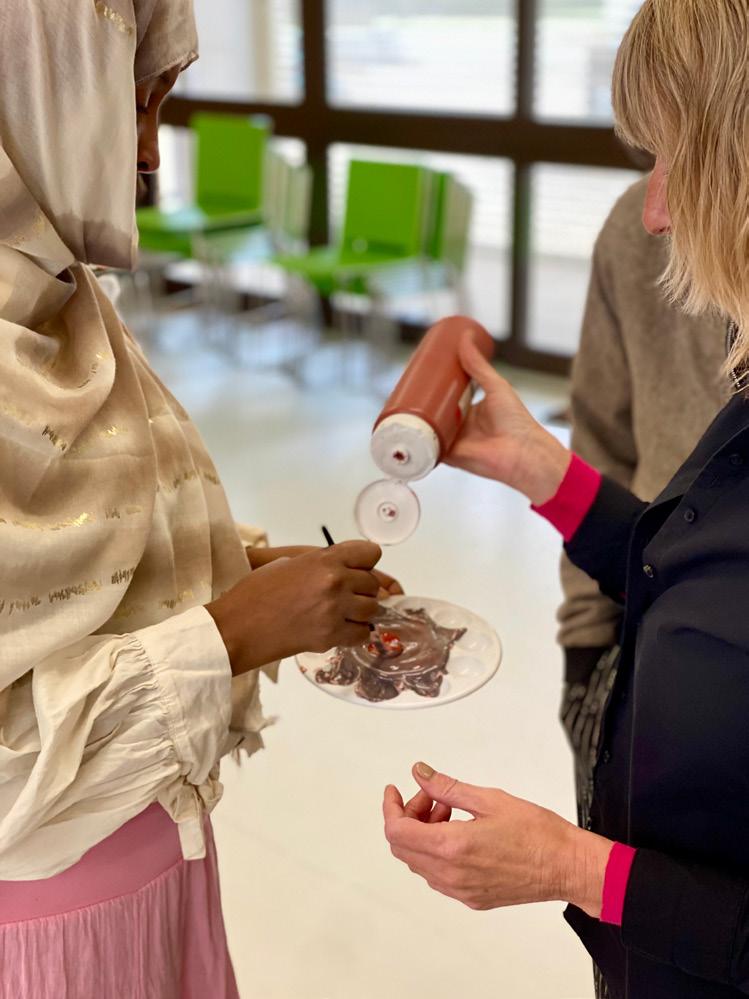
the women are artists, and they have all worked together on the design and creation of the mural, meeting every week in Caledonian Park, spending time working collaboratively, as well as spending time in the park, chatting with staff and other park users, enjoying a cuppa in the fresh air.
They wanted to portray the strength, bravery and commitment of a journey of recovery. This is shown with the strength of the fists, and the chains that have been broken. It looks amazing, and it’s wonderful that it will be on display in the park for all to see.
How has the experience impacted those who took part?
Meeting regularly in Cally Park has been brilliant. Some of the women live locally but have never been before! They’ve enjoyed getting to know it and being out in nature. The women are incredibly proud of their achievement and are excited that the mural will be on public display. It’s been great to see them feel comfortable and confident in the park.

1) Set up ‘sorting stations’ and offer rewards
Create different bins or containers for different recyclable items and challenge them to put things in the right one. Give a sticker or small prize when they get it right. You could come up with a recycling song to sing while you do it, too, or name your recycling bin.
2) Encourage them to only take what they will eat
If you’re regularly throwing away lots of food at the end of meals, show them that it adds up and encourage them to take only what they will eat in future. This also helps children learn about fullness and hunger cues. You could serve dishes ‘family style’ to help with this, so everyone can dish up the amount of food they want. You can always have seconds!
3) Get crafty
Save old items like loo rolls and empty bottles and get creative. You could make art or something practical like a desk tidy or flower planter.
Want to learn more?
Encourage your child’s school to book a trip to EcoPark House: see what happens to your waste and learn more about the circular economy. Visit: nlwa.gov.uk/ Education/EPH
1) Help them to use the toilet on their own: wipe themselves clean, flush, and wash their hands with soap and water. If you have concerns, speak to the school before your child starts.
2) Practice skills of getting dressed on their own. They’ll need to do this for PE and playing outside.
3) Prepare them to sit at a table to eat with others, carry a plate and use a proper knife and fork. If they are taking a lunch box, make sure they can open it and any other containers and packets inside.
4) Help them identify their feelings with words and be confident asking for help. For example, ask them “What would you say to your teacher if you need help putting on your shoes?”
5) Make sure your child is up to date on their routine vaccinations.
6) Make sure they have a good bedtime routine and get enough sleep.
7) Be prepared for your child to be measured as part of the National Child Measurement Programme in their first year. You’ll receive more info about this closer to the time.
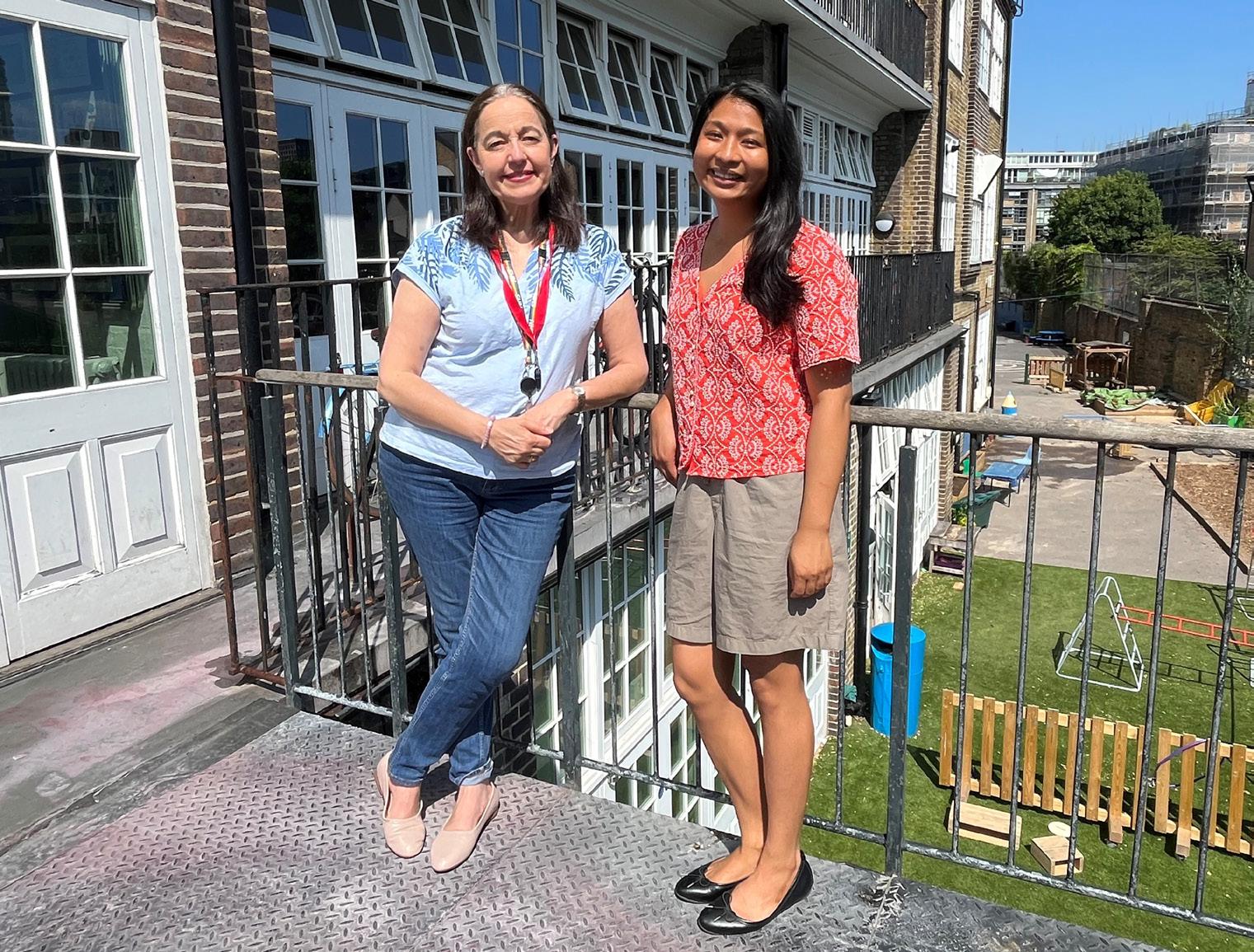
Zaffran, counselling psychologist for the Islington School Wellbeing Service (SWS), and school wellbeing practitioner Aurora on preparing young people for change, red flags and keeping safe online
How can parents and carers help easet the transition to secondary school?
for parents to keep doing what they’ve done before that’s worked – if you had a simple visual homework timetable, continue that. When there is a lot of change, keeping what you can the same helps.
If you have any concerns about starting school, contact the school health team on 020 3316 8021 or email whh-tr. islingtonschoolnursing.nhs.net
Zaffran: We encourage parents to have an open discussion about it and let them know that it is completely normal to feel this way – that even adults can get anxious when change happens and that’s okay. It can also be helpful to create familiarity early on: attend open days, look at maps of the school together or do a dry run of the journey. That can help to reduce the fear a little bit.
Aurora: Children with SEND might need a bit of extra time or support. Prep is key: it’s important
If there are events or induction days for parents or young people with special educational needs, it’s a good idea to go to them. You can ask questions, see the timetable in advance and so on. Then they’re well prepared before the rest of the school joins. Plus, the more a parent knows about the school and the available support, the better equipped they will be.
What about once they’ve started – any tips on settling in?
Z: Encourage independence and create a routine. That could be getting up at the same time every day, as well as preparing the night before: checking their
timetable, packing their bag, laying out their clothes, and a good nighttime routine. The number one thing is to listen and don’t panic! It’s easier said than done, especially if you haven’t had the best school experience yourself, but try not to project your own anxiety. Keep lines of communication open and ask open ended questions, then offer empathy, rather than solutions.
What goes beyond a ‘normal’ or expected level of anxiety?
A: Persistent changes in behaviour: suddenly not wanting to do the things they used to enjoy, sleeping excessively or not enough, complaining of nightmares. Changes in appetite, a drop in school performance, refusing to go to school are also signs. There might be physical complaints, too: frequent unexplained headaches or
stomach aches, feeling very tired often. Social isolation – not wanting to see friends, spending lots of time in their room, or frequently changing friends.
These could also be signs of bullying, along with self-critical comments avoiding certain places, situations or people –or if things keep getting lost or rips appear in their uniform. If your gut tells you it isn’t right, it probably isn’t.
How can we help keep young people safe online?
Z: Start with an open conversation – talk to them early and often about what they’re doing online: the apps they use and whether they’ve experienced anything that’s made them feel uncomfortable. You want to create a culture of trust, while setting clear boundaries.
Discuss the risks of oversharing, cyberbullying and ageappropriate stranger contact – as well as what to do when something doesn’t feel right.
What support is available?
Z: Your first port of call is the school: they have resources and are well connected to professionals. It’s also good for them to be aware if you’re worried, so you can work together. We work with schools to offer one-to-one support for anxiety and low mood. Islington families can also access free online Solihull parenting courses.
If you have any concerns, get support via your GP, school, or get in touch with the Islington social, emotional and mental health team. Call on 020 7527 3355
Have
told
Have you felt guilty about the way you gamble or what happens when you gamble?
Are you concerned about a family member or friends gambling?

Each issue, we shine a light on the people and programmes making Islington a more welcoming borough. This time: the Borough of Sanctuary Grants programme – a £500,000 funding pot for voluntary and community sector organisations helping refugees, migrants and people seeking asylum to settle here. Programme manager Annette Quinn tells us more
The principle of ‘nothing about us without us’ is a concept that’s been around for hundreds of years, rooted in the idea that people should have a say in decisions that affect their lives. That principle guided everything we did – from developing grant criteria to assessing applications.
Seeing it come to life was a real privilege. I could feel the panel’s sense of responsibility and the conviction behind their decisions. They approached the task with such care and insight. And it worked. When people ask me why it’s important for those with lived experience to be part of decision-making, I often think
of the line from Warsan Shire’s poem Home: “No one leaves home unless home is the mouth of a shark.” That line captures the depth of what it means to leave everything behind. There needs to be an understanding of the challenge of starting over – you need to hear from those who’ve lived it to get that.
That’s why we created a panel of experts by experience to decide how the funding was allocated. Their insight was essential in deciding which organisations to fund: the panel were best placed to assess which projects stood out to them as supporting integration and community connectedness. Placing people with lived experience at the centre of decision-making also sends a powerful message. We’re not just asking people what they need, we’re trusting them to shape the response. That’s transformative.
Three ways the council is… improving sustainability on estates
Each issue, we look at how Islington Council is making homes and shared spaces safer, greener, and more welcoming
1) At Frearson House, Penton Rise, kitchens and bathrooms are being upgraded with modern electrical systems to boost safety and efficiency. This includes energy-saving LED lighting, advanced fire detection, and fully renewed sockets and switches.
2) Residents at St Luke’s Estate and Godfrey House are already enjoying the benefits of newly modernised lifts. The upgrades have improved reliability, accessibility, and energy efficiency – and residents have praised the high-quality work and professionalism of the contractors.
3) At Grovedale Estate, the latest play area upgrade has transformed two separate spaces into one vibrant, multipurpose communal area. With new seating, planting, cycle storage, and accessibility improvements – including a trampoline, picnic bench, and accessible path – it’s a space designed for everyone. The council took a sustainable approach, reusing materials like bricks and working within the existing footprint to reduce costs and environmental impact.
Get involved: islington.gov.uk/ MakeChange
Find out more about how the council is improving estates: islington.gov.uk/ ThrivingNeighbourhoods
Each issue, we shine a light on new homes being built in the borough. This time: supported housing at Rosehip House
For Annette, moving into supported living at Rosehip House has been more than just a change of address.
“My new flat is peaceful and I feel safe here,” she says. “I like to visit Holloway Road with my cousins – my family lives nearby and they come to visit me. The staff are really kind too – they help me with my hair and with making food. My favourite is roast beef!”
These are just a few of the everyday joys that have made Rosehip House feel like home for its new residents.
Tucked away on Windsor Street, the new development funded by Islington Council was designed with care, comfort and community
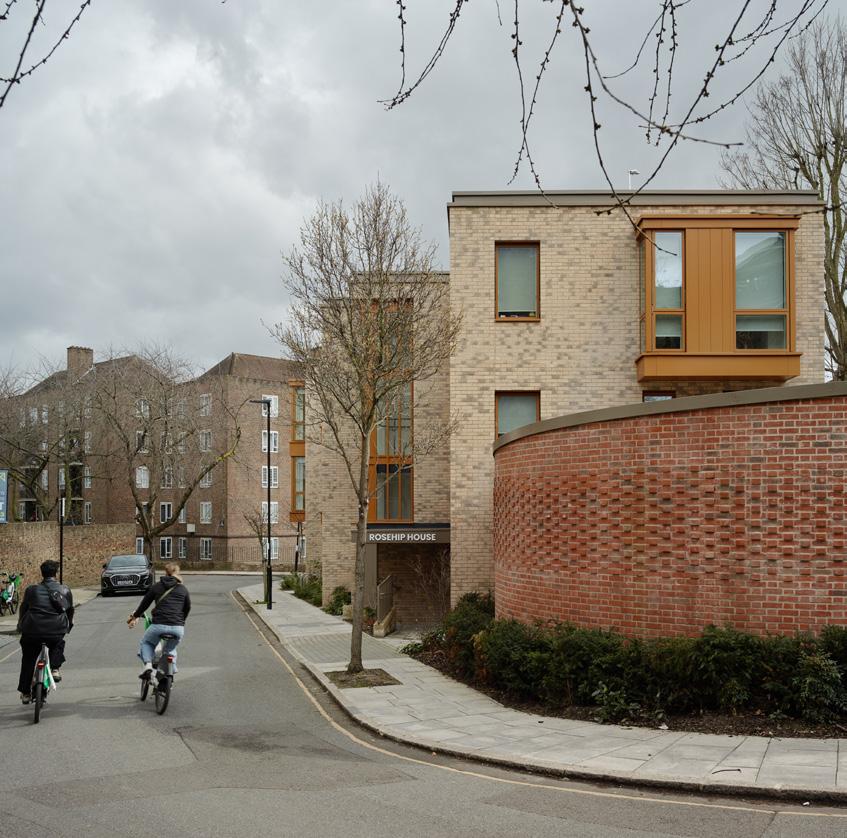
in mind. It will be home to 11 adults with learning disabilities, offering a mix of shared homes and self-contained flats – so everyone can live as independently as they can, with support always nearby, provided around the clock by Learning Disability Network London. But it’s not just about care – it’s about connection. Residents are encouraged to build friendships, explore their interests, and enjoy having their own place.
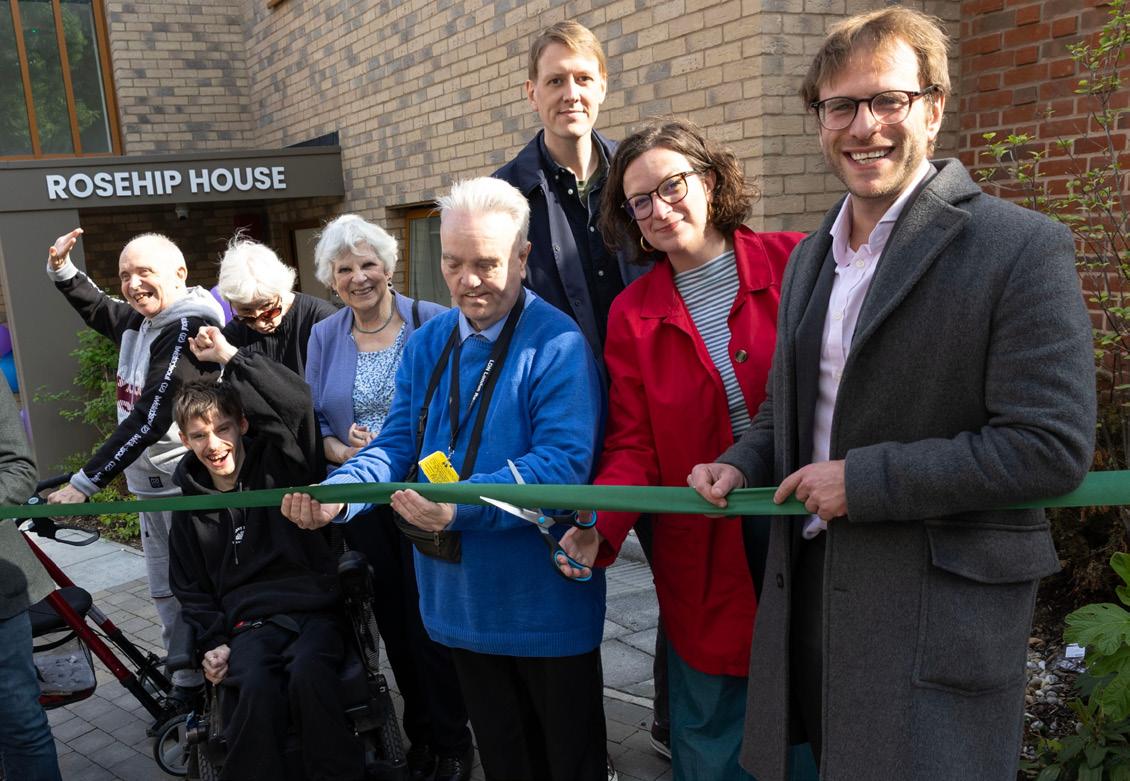

The building is full of thoughtful touches: a sunny garden, cosy lounges, a laundry room, and even a space for care workers to stay overnight. “I like the flowers and trees in the garden,” Annette continues. “I like my new bedroom and I enjoy watching the TV and playing games with my friends in the living areas.”
The design process was collaborative, with the council’s new homes and adult social care teams working closely to deliver a scheme that meets best practice standards for supported living. The name Rosehip House was chosen by members of the Experts by Experience group, a local advocacy team led by people with learning disabilities.
Sustainability was a big part of the project too. Built on the site of a car
park and old garages, 80 percent of original bricks were used to rebuild an unsafe wall, while timber from trees that needed to be removed from a neighbouring estate were repurposed to make furniture for the office and dining areas. New trees have been planted nearby, too. Adding a splash of colour and personality, artwork by local autistic artist and resident Jack Haslam now has pride of place in the garden.
Rosehip House isn’t just a building – it’s a safe haven, where people like Annette can truly flourish.
To learn more about new council homes and other housing developments in Islington, visit the council website: islington.gov.uk/ HousingDevelopment
Hot weather can be dangerous, especially if you find it hard to keep your home cool. If you need a cool space, you can go to any of the places in this directory – there is no cost to attend.
Venues with this symbol are wheelchair accessible.
Brickworks Community Centre 42 Crouch Hill, N4 4BY
Hilldrop Community Centre Hilldrop Lane, Hilldrop Crescent, N7 0JE
St George’s Tufnell Park Crayford Road, N7 0ND
St Mary’s Hornsey Rise Ashley Road, N19 3AD
Whittington Park Community Centre 84 Yerbury Road, N19 4RS
Cat and Mouse Library 277 Camden Road, N7 0JN
Chabad Lubavitch Islington 1-3 Elliot’s Place, N1 8HX
Elizabeth House 2 Hurlock Street, N5 1ED
Light Project Pro International (LPPI) Watkinson Road, N7 8DE
Mildmay Community Centre Woodville Road, N16 9NA
St Stephen’s Church, St Stephens Hall, 17 Canonbury Road, N1 2DF
St Mary’s Church, Upper Street, N1 2TX
Vibast Community Centre 167 Old Street, EC1V 1JN
St Luke’s Community Centre 90 Central Street, EC1V 8AJ
St Andrew’s Church Thornhill Square, N1 1BQ
Inspire Saint James Clerkenwell Clerkenwell Close, EC1R 0EA
Jean Stokes Community Centre Coatbridge House, Carnoustie Drive, N1 0DX
Barbican Library Silk Street, EC2Y 8DS
Newington Green Meeting House 39A Newington Green, N16 9PR
CLR James Library, Dalston Square, E8 3BQ
Haklevi, 31-33 Dalston Lane, E8 3DF
Monday to Friday 8am-9pm
Tuesdays 10am-4pm (term time only)
Wednesdays 10.30am-2pm (wellbeing café)
Monday to Thursday 10am-3pm, Fridays 10am-5pm
Monday, Friday 9.30am-5pm, Tuesday, Wednesday and Thursday 9.30am-12noon
Tuesday, Thursday 9.30am-7pm, Wednesday 9.30am1pm, Saturday 11am-5pm
Monday to Thursday 11am-3pm
Open if you drop into one of their free activities
Monday to Friday 9am-5pm
Monday 9.30am-12.30pm and 3-7.30pm, Tuesday 9.30am5pm, Wednesday, Thursday 9.30am-3pm, Friday 3-8pm
Monday, Tuesday, Thursday, Friday 12noon-6pm, Wednesday 9am-6pm
Monday to Sunday 9am-5pm
Monday to Friday 9.30am-4.30pm (except August)
Monday to Friday 9am-7pm
Saturday 11am-1pm, Sunday 9am-12.30pm
Monday to Friday 9.30am-5.30pm
Monday to Friday 9am-5pm
Monday, Wednesday, Friday 9.30am-4.30pm, Tuesday, Thursday 9.30am-7.30pm, Saturday 9.30am-4pm
Thursday, Friday 12noon-6pm
Monday to Thursday 9am-8pm, Friday 9am-6pm, Saturday 9am-5pm, Sunday 1-5pm
Monday to Saturday 10am-3pm

The average Islington household produces 349 KG of waste every year. About 30% of this currently gets reused, recycled or composted. or 50 watermelons!
We’re all working hard to do our bit to recycle responsibly and Islington Council is here to help.



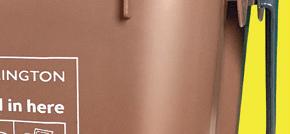
That’s about the same as an adult polar bear




We’re tracking tonnage and contamination rates more effectively than ever.
We’re one of the few London boroughs to offer food waste recycling services to block of flats and, soon, flats above shops.

£2M
















CHECK WHAT YOU CAN AND CAN’T RECYCLE



















In recent years, we’ve taken great strides to improve recycling in Islington. We’re investing £2m in estate recycling facilities and are asking residents on those estates to have their say on the improvements they want to see.
We’re also working hard to help you understand what goes where and how you can take steps to make sure everything that can be recycled, gets recycled. Let’s work together to make Islington an even cleaner, greener borough. Do your bit. Recycle it.
Want to get involved and stay up to date?
Follow us on X @IslingtonBC, and search “Islington Council” on Facebook and Instagram
You can also sign up to our recycling newsletter to learn more about the dos and don’ts of recycling.
Scan the QR code to subscribe.
Recycling is easy and protects our environment, when we get it right... make sure you know which bin to put things in.

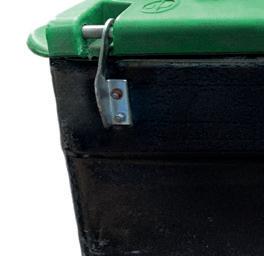
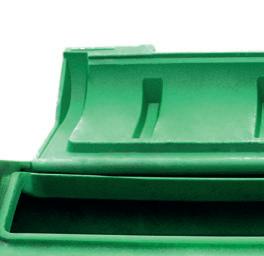
























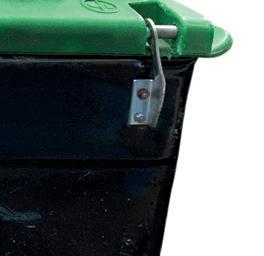
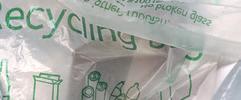














































Empty aerosol bottles (deodorant, hairspray, air freshener)




Shower gel and hand wash bottles (with the pump)
Just one wrong item can spoil everything in the recycling bin.








Spray cleaners (with the trigger spray)
Empty moisturiser pots, tubes and jars

















Blister packs – many high street chemists










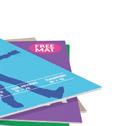


Magazines, newspapers and envelopes (including window envelopes)

Empty and rinse all containers before recycling




Clean foil and foil containers
Check what you can and can’t recycle at home


HOW TO RECYCLE OTHER ITEMS:





Batteries and vapes – most local shops or supermarkets Mercury and energy saving lightbulbs –Reuse and Recycling Centre on Hornsey Street
film – at most supermarkets
Small electrical items – five recycling sites across Islington Clothes and bedsheets –textile recycling sites across Islington




and kitchen roll










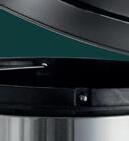












black trays and bags



glasses







